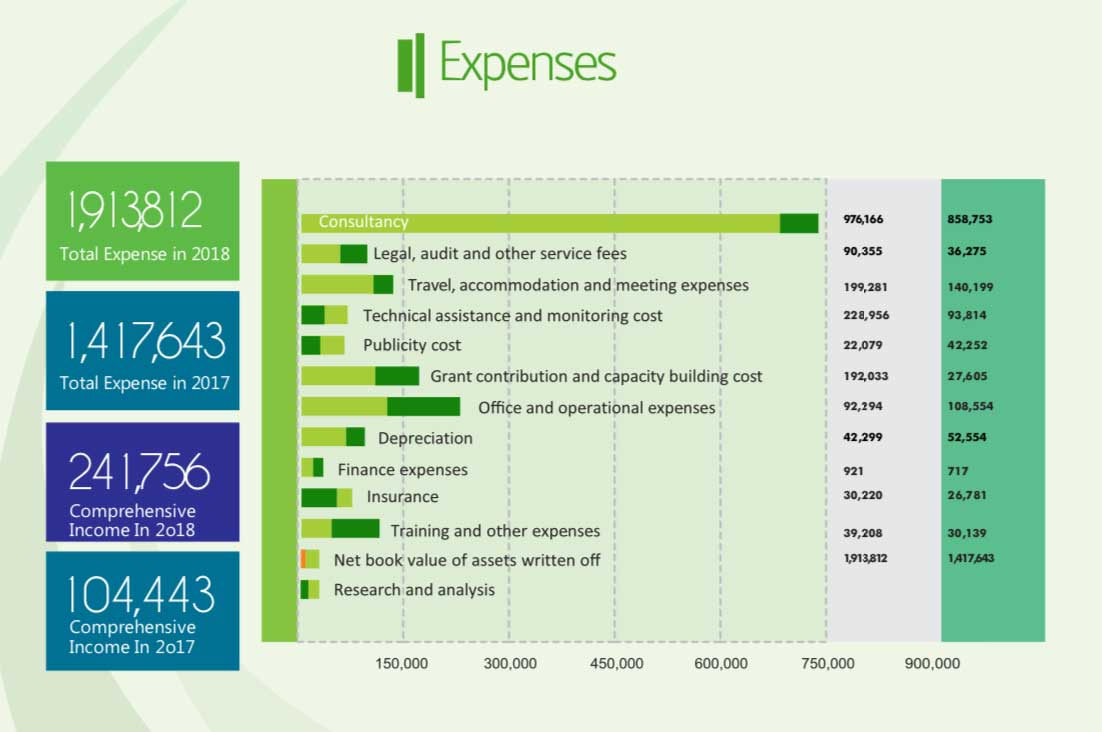Introduction
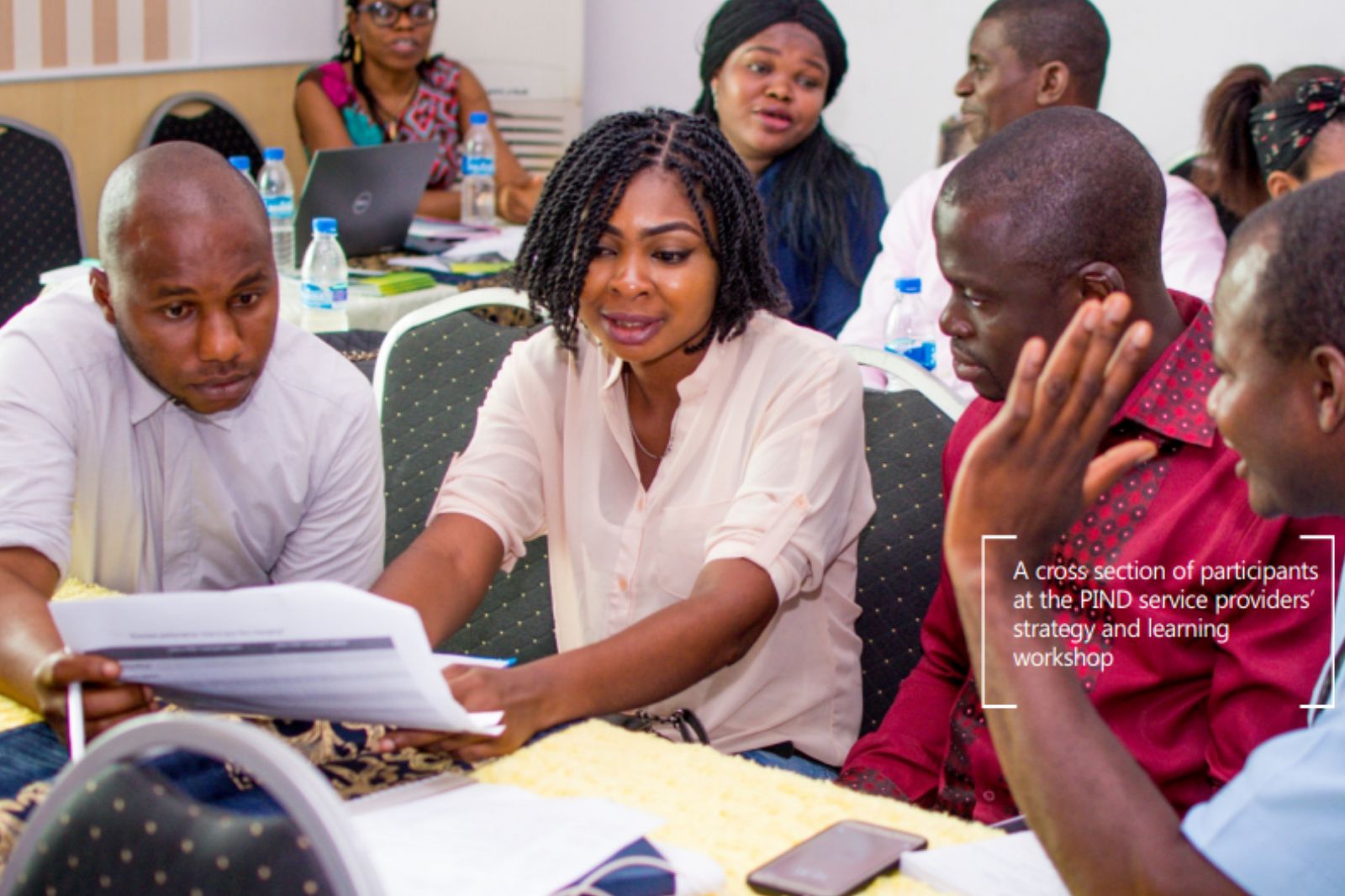
While it's usually quite easy to identify what an organization does, determining how it creates value is not always as easy. In this year’s annual report, we give an account of how our work in in the Niger Delta aids the human capital development of our target sectors and stakeholders from the context of ‘the Value that we Bring’ as a Foundation
Investing in Human Capital for Wealth Creation in the Niger Delta
While it's usually quite easy to identify what an organization does, determining how it creates value is not always as easy. In this year’s annual report, we give an account of how our work in in the Niger Delta aids the human capital development of our target sectors and stakeholders from the context of ‘the Value that we Bring’ as a Foundation
To improve economic opportunities that can reduce poverty and conflict, a different approach is required to what has been deployed traditionally. Such a human capital development approach has to be sustainable, inclusive, able to identify, inspire and empower individuals, organizations and systems within the productive sectors to foster change (as champions); and cascade that change among peers who then adopt it and spread its benefits system-wide. This way, empowered sector actors can perform their core functions and businesses within a delicate macro-economic environment in an effective, efficient and sustainable manner, and also continue to improve and develop over time without dependency on donor projects or government support.
This type of sustainable human capacity development goes beyond skills acquisition or development. It is informed by rigorous evidence from data, and it is a change process that takes time to achieve as it focuses on various actors that make up the ecosystem rather than on single individuals. Our approach is a combination of complementary support actions such as skills building, market/information linkages, technical advice, tools, platforms and resources that can trigger and fast-track the growth process.
This is what human capital development means to us at PIND, and in this report we present our contributions.
WATCH OUR VIDEO ON HUMAN CAPACITY DEVELOPMENT
Who We Are

Our Mission
Our mission is to promote equitable economic development and peace through partnerships in the Niger Delta
Our Vision
We hope to achieve a strong legacy of sustainable peace and development among communities in the region
Our Core Values
The Foundation holds firmly to the core values of partnership and collaboration; learning and innovation; stewardship; integrity; and sustainability
Our Strategy
Our activities are structured within four distinct programs, including:
- An Economic Development Program focused on generating opportunities for market development and employment generation;
- A Peace-Building Program that strengthens conflict resolution mechanisms for enabling integrated peace and economic growth;
- An Analysis & Advocacy Program that improves analysis and understanding of systemic constraints to growth in the Niger Delta region; and
- A Capacity Building Program that will build the service delivery and engagement capacity of government, civil society and communities to deliver economic growth and peace.
Our Geographic Focus
PIND’s interventions span across all the nine states of the Niger Delta: Abia, Akwa Ibom, Bayelsa, Cross River, Delta, Edo, Imo, Ondo and Rivers
Now that you've met us, please read the heart-warming message from our Chairman of the Board and the Executive Director for the year 2018.
Message from the Chairman, and the Executive Director

Investing in Human Capital Development for Wealth Creation in the Niger Delta
Dear Partners and Friends,
From our inception in the year 2010, you have walked with us in our journey towards promoting peace and equitable economic development in the Niger Delta through partnerships. Working with a variety of partners and friends like you who share the same vision with us was pivotal to our achievements in peacebuilding and economic development during the year.
The availability of skilled human capital is low in Nigeria. The World Bank’s 2018 Human Capital Index ranked the country 152 out of 157 countries. Small holder farmers and Micro, Medium and Small sized Enterprises (MSMEs) in the Niger Delta are part of these statistics as, despite the high potentials for income and jobs for a vast majority of them, lack of capacity has prevented them from reaping the economic potentials. The situation is severe in hard to reach coastal communities of the region who are underserved because of their inaccessibility.
In the light of this, in 2018, we intensified our investments in human capacity development to unlock wealth in the Niger Delta using several approaches. In the economic development program, we scaled- up our adopted ‘service providers' model as we empowered more service providers with skills, and resources to go beyond PIND and reach more farmers and SMEs with training and business advisory services that are changing their fortunes. With this model, we have been able to tackle some of the prevalent human capacity development challenges in the agriculture and SMEs sectors and broadened PIND’s reach. By the end of 2018, these service providers had equipped over 7,900 SMEs and over 62,000 farmers and processors (from over 150 farming clusters across the region) with improved agricultural practices, access to inputs, business practices, information and adoption of new technologies.
Inclusive human capital development is key and in 2018 we focused on ensuring that the region’s hard to reach communities in Delta, Bayelsa and Ondo States have greater access to improved fish smoking Chorkor ovens and alternative energy technologies for off-grid communities using Energy Cabins that are spurring development innovations. The adoption of the Chorkor ovens has helped fish smokers to improve the efficiency of their activities as they process larger quantities of fish with reduced fuel sources and overall costs, compared to the traditional drum method of smoking fish and thereby increasing their overall sales and incomes. The pilot of the Energy Cabins in 2019 will ensure the availability of the productive energy essential for unlocking the full potential of businesses in these communities.The availability of skilled human capital is low in Nigeria. The World Bank’s 2018 Human Capital Index ranked the country 152 out of 157 countries. In the light of this, in 2018, we intensified our investments in human capacity development to unlock wealth in the Niger Delta using several approaches.
With the Niger Delta recording some of the highest unemployment rates in the country, we targeted vulnerable youth in the region with the pilot of our Niger Delta Youth Employment Pathways (NDYEP) project that combines the development of technical, soft, and entrepreneurship skills with a robust post-training support that will help to transition the trained youth into meaningful employment or to join a new class of job creators. Over 1,200 youth are already enrolled in this project.
The Foundation also responded to human capital priorities in the peacebuilding sector by consolidating and institutionalizing the capacity of the Partners for Peace (P4P) Network, a self-sustaining membership organization for conflict resolution and mitigation in the Niger Delta in 2018. Through the platform for collective actions, skills, data and resources that we provided to them, the over 7,500 peace agents belonging to the Network have helped to prevent and mitigate more than 153 local conflict incidents till date using a wide range of peacebuilding activities which included conflict early warning, conflict prevention, conflict management, and conflict resolution.
Our ‘learning by doing’ coaching and mentoring support on proposal writing and resource mobilization skills helped 54 Civil Society Organizations to overcome their inability to mobilize funds for social and economic services as they accessed grants worth over NGN434 million to implement community development services during the year. Using peer to peer learning approach, our 2018 annual Niger Delta Development Forum (NDDF) roundtables provided government representatives from seven States the opportunity to hone their ability in crafting long term development plan for their respective States. Through our dedicated and hardworking partnership with you, we achieved many successes this year which earned us the Nigeria Energy Awards given by Nigerian Association of Energy Economics, along with two recognitions by the Office of the Vice President of Nigeria for PIND’s commitment to ending gender based violence in Nigeria; and the Delta State Government, in recognition of PIND’s leadership role in promoting peace in the state.
Our performance in 2018 was a combination of strong partnerships and endurance. To achieve significant success in the face of the dire human capital indices, we expanded our cross sector collaborations and linkages, adding 42 new partners in the year to extend the reach of our work. PIND has connected to over 800 organizations through a cumulative of over 140 regional, national and international direct partnerships.
These combined resources and expertise of these partnerships have equipped thousands of people in the Niger Delta agricultural, peacebuilding, civil society and youth employment market systems with the capacity to slowly inch themselves out of poverty.Our performance in 2018 was a combination of strong partnerships and endurance. These combined resources and expertise of these partnerships have armed thousands of people in the Niger Delta agricultural, peacebuilding, civil society and youth employment market systems with the capacity to slowly inch themselves out of poverty.
In 2019, by leveraging these attributes, we will continue to intensify the implementation of PIND’s programs in the coastal communities, push our piloted models for replication and adoption, and develop a new Strategic Plan for our Phase 3 funding cycle. We remain confident of your continued support as we work to improve the lives of millions of Niger Deltans.
2018 in Review:
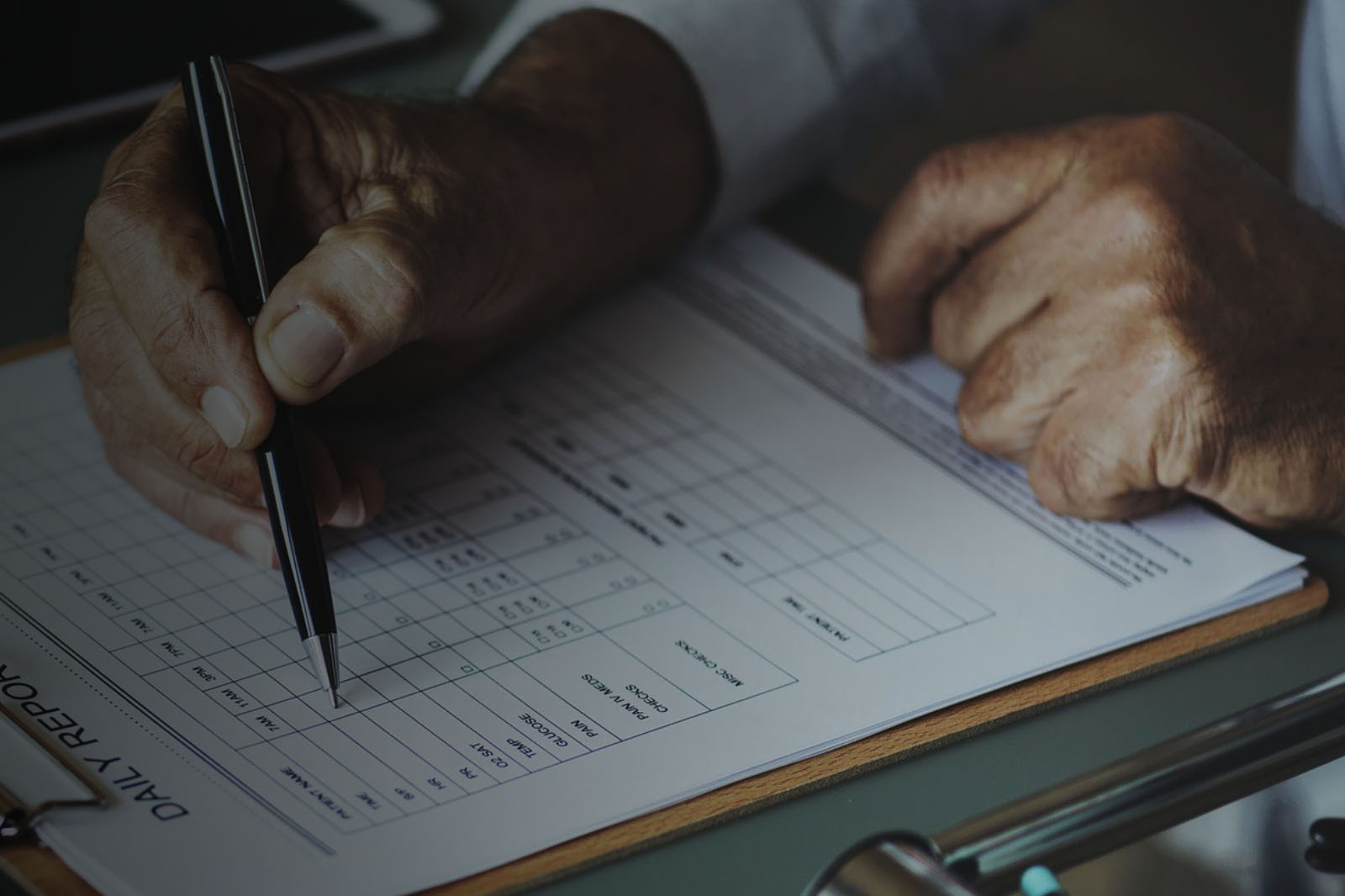
Increasing the numbers of people we reach with our interventions is crucial for us at PIND. Notwithstanding, what counts is the impact on the lives of the people. Our goal is to achieve sustainable reductions in poverty and conflicts in the Niger Delta. In 2018, we stepped-up our impact in numbers and we are still counting.
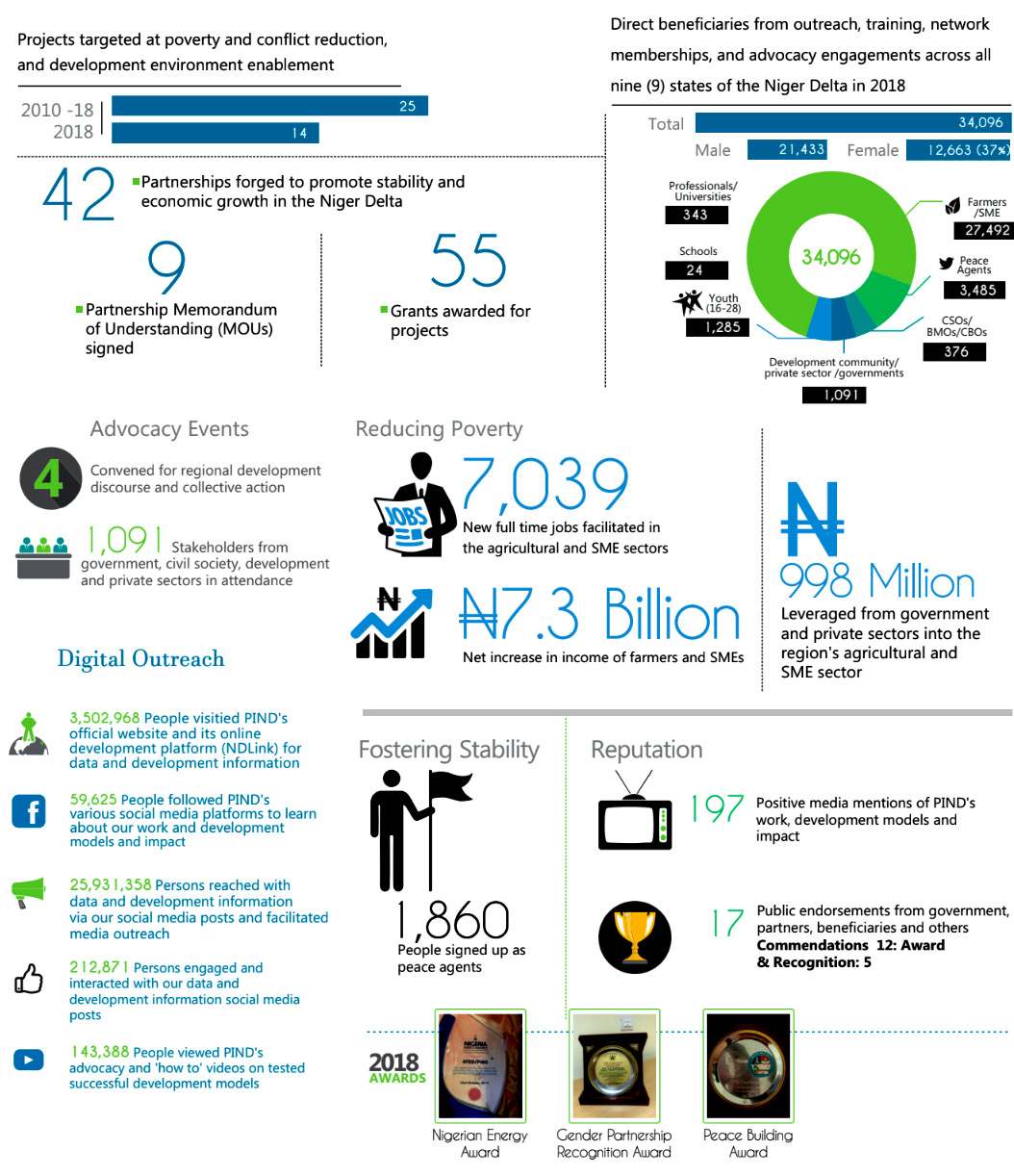
How We Placed Women and Girls at the Heart of Our Human Capital Development Activities in 2018
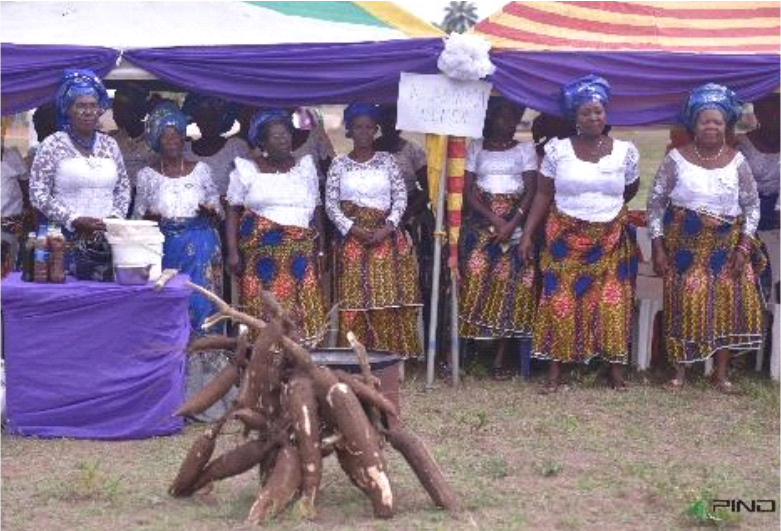

Our Timeline of Growth & Impacts

Over nine years, we have undergone two strategic funding phases, two significant leadership changes, and spread our projects pool. Here is a quick recap of our growth and impact from 2010 to 2018
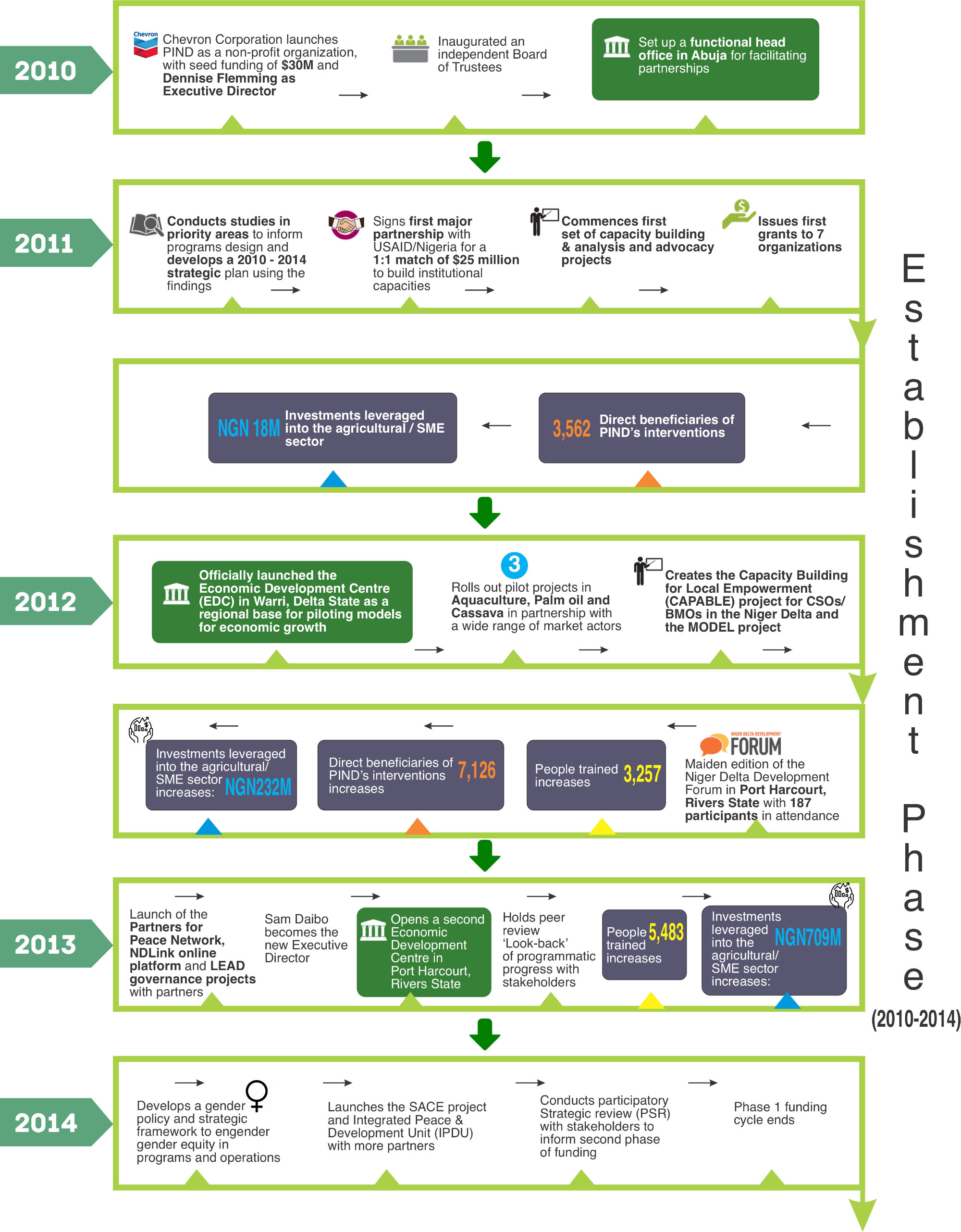
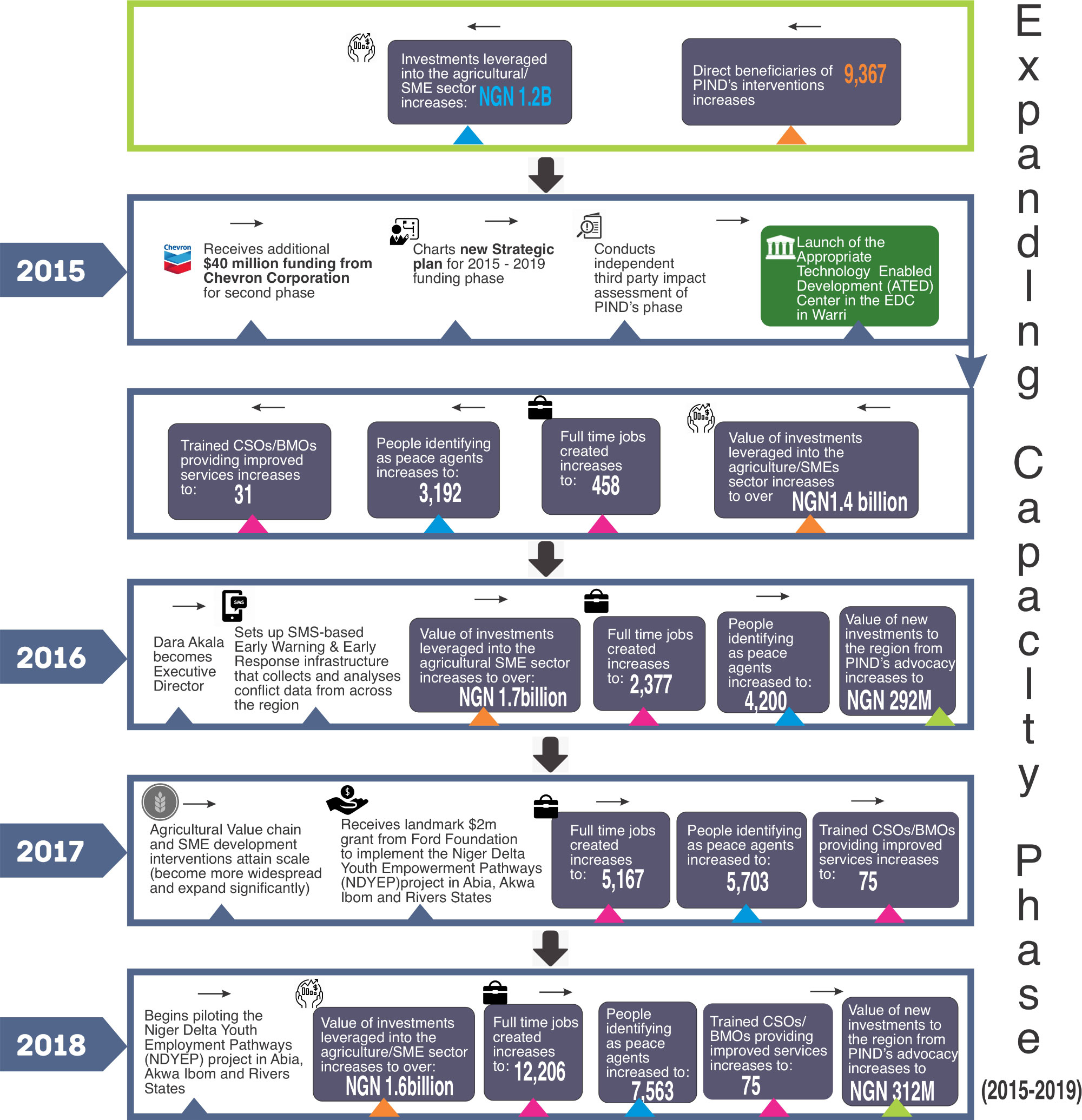
Our Extensive Knowledge of the Niger Delta
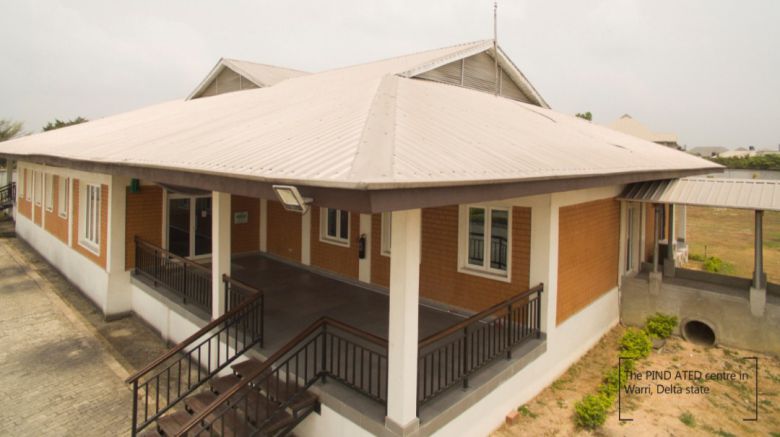
With our work reaching into rural and hard to reach communities, and interventions in over 200 farming communities located in the nine States of the region, we have gained knowledge of local context and dynamics that aid impact programming
Our Economic Development Centres (EDCs), robust data resources and region-wide interventions form the basis of our extensive knowledge of the Niger Delta that has contributed to the results in our four program areas that we present in this part of the annual report
 PIND’s interventions span across all the nine states of the Niger Delta: Abia, Akwa Ibom, Bayelsa, Cross River, Delta, Edo, Imo, Ondo and Rivers.
PIND’s interventions span across all the nine states of the Niger Delta: Abia, Akwa Ibom, Bayelsa, Cross River, Delta, Edo, Imo, Ondo and Rivers. The Foundation has its foot well over the region, with Economic Development Centres (EDCs) in Warri, Delta State and Port Harcourt, Rivers State serving as resource and coordination hubs for us and our partners to develop and implement projects aimed at reducing poverty in the Niger Delta through income, jobs and stability.
From the EDCs, we conduct numerous formative research on growth sectors and issues pertaining to development. This has provided us with rich data resources and deep insights about the region that informs our projects design. It further ensures we apply systemic analysis in addressing the innate constraints in our select market systems and the broader development eco-system.
For example, in 2018, we commissioned an assessment of the cocoa value chain in the Niger Delta which is currently the most up to date data on the sector. Each year, we conduct impact assessment of our interventions to understand what works or does not work in the region. Over six of such studies held in 2018.
With our work reaching into rural and hard to reach communities, we have gained knowledge of local context and dynamics that aid impact programming. We have intervened in 153 farming communities located in the nine States of the region, mapped over 11,000 regional conflict data points and, through the Partners for Peace (P4P) Network, mobilized over 7,500 peace agents – all across the region
Our EDCs, robust data resources and region-wide interventions form the basis of our extensive knowledge of the Niger Delta that has contributed to the results in our four program areas that we present in this part of the annual report.
Economic Development Program
Strong Expertise in Market-Systems Development Approach

When PIND came into the region in 2012, there was a collapse of the support market system for farmers and SMEs. We realized that we needed to approach human capacity development in a way that is different from the traditional approaches – we needed to revive the support market system. So from inception in 2012, we adopted the service providers' model.
FACT BOX
Reducing Poverty 2012-2018
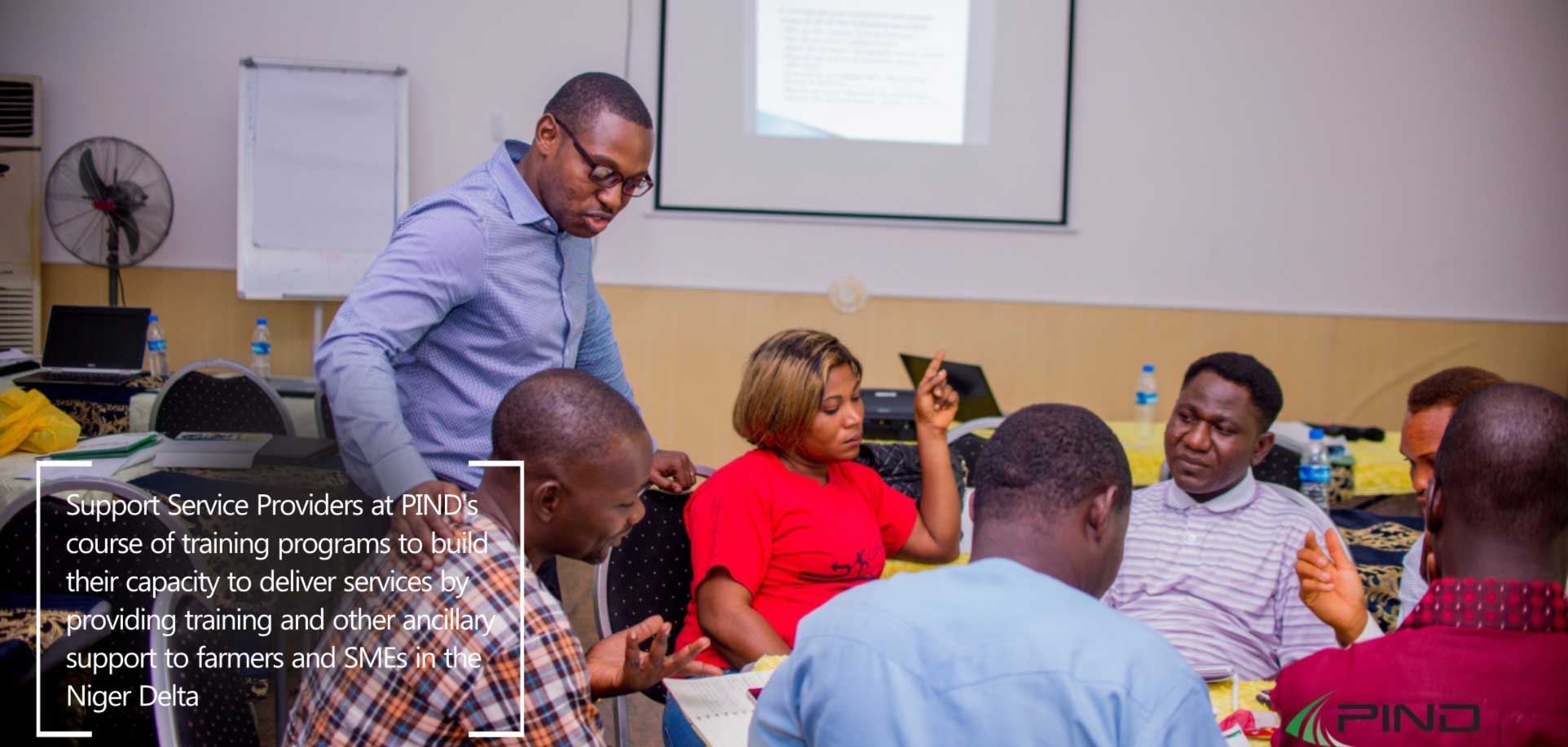
This year, we scaled- up our adopted service providers' model as we empowered more service providers – lead farmers, aquaculture service providers (ASPs), business service providers (BSPs), agro-equipment fabricators and agro-dealers, input companies – with skills, and resources to go beyond PIND and reach more farmers and SMEs with training and business advisory services that are changing their fortunes.
By the end of 2018, over of these service providers have equipped over and over - through over demonstration farms in over farming clusters and communities across the region- with improved agricultural practices, access to inputs, business practices, information and adoption of new technologies
WATCH THIS VIDEO ABOUT OUR SERVICE PROVIDERS’ MODEL
MEET SOME OF OUR SERVICE PROVIDERS IN THIS VIDEO
 Market systems are made up of various actors – the core functions such as production and the support functions that enable the core functions to thrive. Despite the fact that the aquaculture, cassava and palm oil sub-sectors of agriculture and the Micro, Small and Medium Enterprises (MSMEs) in the region have high potentials to generate income and create jobs for a large number of poor people, we found out that it was difficult for poor people to reap from the economic potentials.
Market systems are made up of various actors – the core functions such as production and the support functions that enable the core functions to thrive. Despite the fact that the aquaculture, cassava and palm oil sub-sectors of agriculture and the Micro, Small and Medium Enterprises (MSMEs) in the region have high potentials to generate income and create jobs for a large number of poor people, we found out that it was difficult for poor people to reap from the economic potentials.
This failure was because smallholder farmers did not exhibit good agricultural and business practices while poor access to finance and lack of knowledge of and access to new technologies for production and processing were widespread. In addition to this, the relationship between farmers and other players and businesses like processors, input suppliers, agro-equipment dealers and people who can train and provide advisory services to farmers was fragmented and un-coordinated. There was a collapse of the support market system in the region.
With the proficient knowledge of the hindrances, we realized that we needed to approach human capacity development in a way that is different from the traditional approaches – we needed to revive the support market system. So from inception in 2012, we adopted the service providers' model. The model entailed executing human capacity development activities to improve the skills of farmers and other businesses involved in agriculture and the way the markets work together to promote development – and doing this in a sustainable manner that will ensure that all do not disappear at the end of PIND's intervention.
We identified different types of support service providers (and related products) required by farmers and SMEs to increase their productivity and income – lead farmers, aquaculture service providers (ASPs), business service providers (BSPs), agro-equipment fabricators and agro-dealers, input companies – and went on to build their capability to deliver services by providing training and other ancillary support.
● Lead farmers and aquaculture service providers: PIND trained the lead farmers and service providers from the farming associations on best agricultural practices and pond management practices at demonstration plots/ponds. They, in turn, train farmers' association members
● Local fabricators and masons – trained to produce, promote and sell several efficient technologies such as those for fish smoking, palm oil harvesting and processing
● Business service providers - trained to provide –for a fee - market linkages, finance and business advisory services to select Niger Delta-based micro, small and medium-scale enterprises (MSMEs)
● Agro-equipment fabricators – attracted to expand their product offerings by investing in the sale and servicing of palm oil harvesting and processing technologies, so they are available to farmers and processors
● Input companies and agro-dealers – incentivized to partner in using demonstration plots as learning laboratories for farmers to learn sound practices by doing.

As part of human capital development, PIND showed the various service providers and farmers opportunities in the sectors and the incentive for them to work together to create a “win-win” outcome for everyone – better farming practices for farmers, a technology-enabled method for processors, new business opportunity for input companies and agro-dealers and service providers. We further supported them with additional resources and tools such as training manuals and videos, start-up grants, SME diagnostic tools, business loans and platforms for relationship building, collaboration and knowledge transfer.
Peter Michael, a PIND trained ASP, explained that "PIND trained us on how to do strategic plans. So what I did was help the farmers draft their business plan, and provide technical support. They pay me for my services. I was able to offer support services, both training and technical services, to a group of farmers who have been able to access both grants and loans. Now I have ten persons whom I've trained who are also offering services".
Over time, with the comprehensive capacity development of the service providers comprising of skills, resources, tools and linkages, we started getting the people to think differently and to gradually change their attitude and practices. With this new approach, we were able to identify and tackle some of the systemic constraints inhibiting growth in the agriculture and MSMEs sectors in a sustainable manner.
Ayodele Kayode works at Bayer, one of the leading agro-input companies that provide input and solutions such as pesticides (insecticides) and herbicides that improve crops production. He acknowledged the importance of PIND's facilitative role in the promotion of networking for opportunities among various service providers and farmers. "I work for Bayer, I'm the field solutions and stewardship engineer. So basically, I work with farms. What we have derived in this partnership with PIND is to develop a sustainable relationship with the farmers, the agro-dealers and all stakeholders in the agro-business. Not limited to cassava alone because we are a major player in all crops. Now it is also to create sustainable value for everyone that is involved".
Following our integrated capacity development effort from 2012 to 2018 that tackled a broad range of constraints in the three agricultural sub-sectors and SMEs:
Of 81 business and aquaculture service providers trained, 34 are selling their training and business advisory services to farmers and MSMEs (new business opportunities, these services didn’t exist before)
Over 270 demonstration farms for training on good agricultural practices have been set up and managed by input companies, lead farmers, agro-dealers and service providers across nine states of the Niger Delta, reaching over 62,000 farmers from over 200 farming clusters and communities with the right knowledge, attitude and practices to improve their agricultural and business outcomes. Demonstration farms (ponds for aquaculture and plots for cassava and palm oil) are vital in the human capacity development of farmers in the Niger Delta because they produce much stronger impact than training in the traditional classroom.
Over 7,900 MSMEs are able to access services and finance to upgrade their businesses and expand into new markets.
Of 223 Agro-equipment dealers and fabricators trained, 50 are producing and selling and servicing their new efficient technology product lines to farming communities and making new sales from it (new business opportunities as – 115 processing equipment, 361 harvesting technologies, 104 fish smoking technologies sold and in use in 2018).
Over seven Input companies are reaching more farmers with their products through the demonstration farms and engagements.
In the process of delivering their services, the service providers' corps has contributed to the scaling and replication of PIND's pilot interventions in different locations in 2018.
Aquaculture
Aquaculture Service Providers (ASPs) & Inputs Companies

FACT BOX
2018: Aquaculture
 The African catfish is a fast-growing farmed fish species in the Niger Delta. Catfish farming is common in the Niger Delta due to the fish's easy to rear nature, unique taste and high nutritional value. Catfish delicacies are increasingly popular in Nigerian homes, restaurants and hotels. Many however ventured into the business without having access to expertise in aquaculture that can assist in building their technical capacity for increased productivity. As a result of this, there has been an increase in demand for the services of ASPs in different locations.
"One challenge was that I did not even know how to feed them well and then how to measure their weight before selling and their health conditions. I did not really have an idea of it. Also, record keeping was a challenge” said Linda Okparaeke, who ventured into fish farming without any form of training. “The capital I used in investing in it, I did not get it. That was about 60,500 naira. Because of the lack of knowledge and how to take care of them, most of them died."
The African catfish is a fast-growing farmed fish species in the Niger Delta. Catfish farming is common in the Niger Delta due to the fish's easy to rear nature, unique taste and high nutritional value. Catfish delicacies are increasingly popular in Nigerian homes, restaurants and hotels. Many however ventured into the business without having access to expertise in aquaculture that can assist in building their technical capacity for increased productivity. As a result of this, there has been an increase in demand for the services of ASPs in different locations.
"One challenge was that I did not even know how to feed them well and then how to measure their weight before selling and their health conditions. I did not really have an idea of it. Also, record keeping was a challenge” said Linda Okparaeke, who ventured into fish farming without any form of training. “The capital I used in investing in it, I did not get it. That was about 60,500 naira. Because of the lack of knowledge and how to take care of them, most of them died."
In 2018, 38 ASPs built capacity of fish farmers in pond management practices on how to prepare pond before stocking, including cleaning, liming and fertilizing; how to control predators and competitors in the pond; checking pond water quality parameters; feeding the fish, maintaining an improved pond environment, performing health checks on the fish and how to manage pond environment problems. During the year, the ASPs deepened their relationships with other businesses like the fish feed companies and feed retailers operating in the region, which brought about new business opportunities and partnerships.
 For example, Grand Cereals Limited, a leading fish feed manufacturer partnered with 10 ASPs to reach 2, 007 fish farmers in the riverine communities in Bayelsa and Ondo State with training in best pond management practices and use of fish feed.
For example, Grand Cereals Limited, a leading fish feed manufacturer partnered with 10 ASPs to reach 2, 007 fish farmers in the riverine communities in Bayelsa and Ondo State with training in best pond management practices and use of fish feed.
"Before I met PIND I was doing humanitarian services, - so I just offered my training for free," said Bassey Jacob, an ASP who raised his profit to up to 80 percent following training and linkages provided by PIND. “After PIND, my profit margin has improved by 80%. Now I train farmers, and they pay for it, and they enjoy the service. Sometimes I give free services as incentives, but at the end of the day, I have products that they would pay for which implies my services and my time would not be in vain. My customer base has increased over 60-80% after my contact with PIND. Why? Because I received high-class training and then, I implemented the training to myself first and then to my business. So that has helped in the increasing trend in my business."After PIND, my profit margin has improved by 80%.
As PIND-trained ASPs continue to sell services to new and existing fish farmers on improved agriculture and business practices, there has been a reduction in the human capacity gap in aquaculture as 3,800 fish farmers reported an increased income in 2018. As the ASPs’ services expanded based on demand, their activities brought increased investments in the catfish aquaculture value chain, and they are now recruiting other ASPs to support their businesses. 16 ASPs are already working with 20 new Trainee Service Providers in other to meet the increasing demand for human capacity development in the sector. Download Aquaculture Report
Cassava
Agro-Dealers, Inputs Companies & Lead Farmers
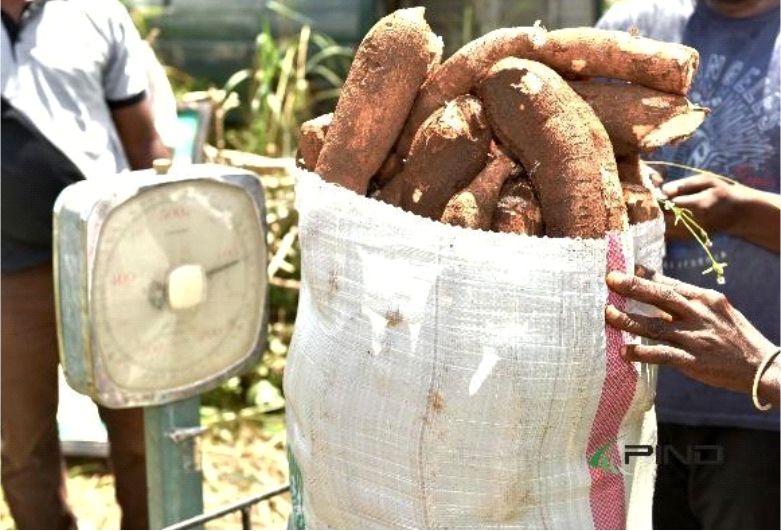
FACT BOX
2018: Cassava
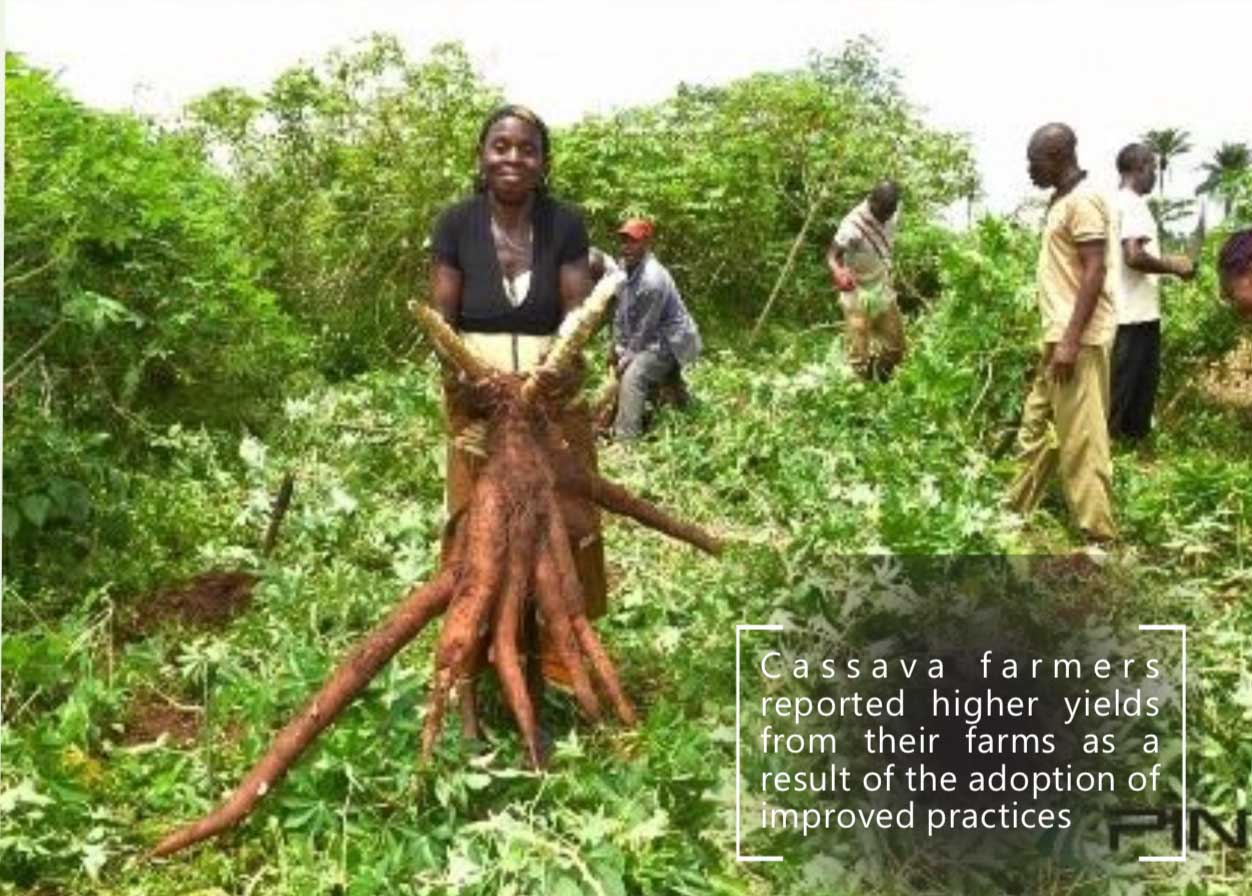 Cassava is among the favorite staple foods grown in Nigeria and has an increasingly diverse use for its products. As a result of its multi-purpose utilization, cassava farming is becoming lucrative and offers numerous opportunities to would-be investors. Experts and operators in the business have stated that cassava and its products serve as food to about 90 per cent of Nigerian households.
Cassava is among the favorite staple foods grown in Nigeria and has an increasingly diverse use for its products. As a result of its multi-purpose utilization, cassava farming is becoming lucrative and offers numerous opportunities to would-be investors. Experts and operators in the business have stated that cassava and its products serve as food to about 90 per cent of Nigerian households.
In 2018, there was a significant expansion of all of PIND's interventions in the cassava value chain around best practices in cassava farming, improving the access of farmers to enhanced crop protection products and processing technologies through demonstration plots, implementation of the out-grower schemes and market linkages activities.
A major contributor to this expansion and results in the cassava sector is the demonstration plot intervention. Four input companies and seven agro-dealers worked together to scale up demonstration plot farms to eight States in the region, reaching 4,499 farmers directly with technical and business training. Remarkably, PIND's partnerships with input companies and agro-dealers and promotion of linkage as a form of human capacity development contributed to improved practices which attracted new investments as farm business owners invested in the adoption of the enhanced model introduced by PIND in their private farms.
With the skills received through demonstration farms, McThompson Ifeanyi Eke, a cassava farmer and other members of the Mezie Umukabia Farmers’ Multipurpose Cooperative Society in Imo State started practicing their cassava farming differently and with high yielding results.
For example, a demonstration plot established in partnership with Harvest Field Industries Limited and The Association of Graduate Farmers in Ondo State yielded impressive output. According to Ayobami Melord, an executive of the association: “We realized 37.6 tons per hectare, which I have never seen since I have been doing cassava farming. We want to appreciate PIND”.
Cassava farmers reported higher yields from their farms as a result of the adoption of improved practices. Average yield recorded by the farmers increased from 8 tons per hectare to 16.3 tons per hectare.
Download Cassava Report
Palm Oil
Lead Farmers, Agro-Dealers, Fabricators & Input Companies
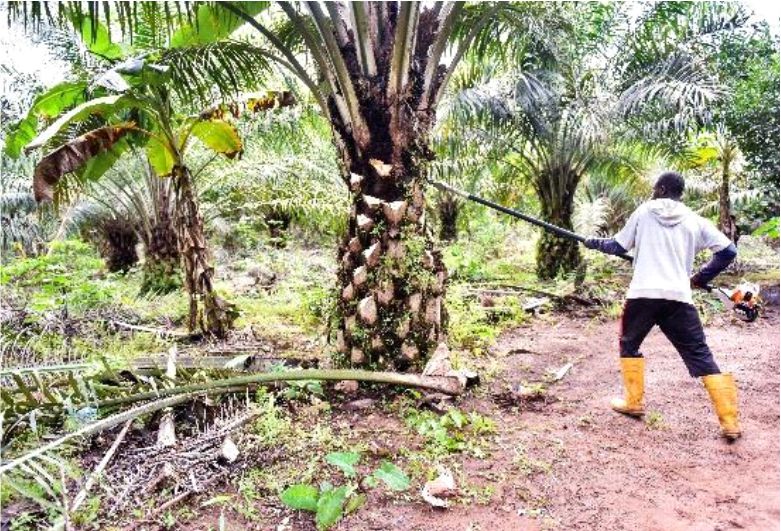
FACT BOX
2018: Palm Oil
 Creating greater efficiency in harvesting and processing is critical to developing the palm oil market system in the Niger Delta as palm oil has been classified as a significant contributing commodity to the Niger Delta economy. The technologies would enable farmers and processors to produce in quantities that are necessary to support and be attractive to larger off-takers supplying national and export markets. To date, the use of efficient technologies for oil palm has not been fully incorporated into the sector in the region.
Creating greater efficiency in harvesting and processing is critical to developing the palm oil market system in the Niger Delta as palm oil has been classified as a significant contributing commodity to the Niger Delta economy. The technologies would enable farmers and processors to produce in quantities that are necessary to support and be attractive to larger off-takers supplying national and export markets. To date, the use of efficient technologies for oil palm has not been fully incorporated into the sector in the region.
PIND has been a pioneer in the promotion of efficient technologies for oil palm in the Niger Delta. “Through PIND, they have made it successful for us to have the machine in the country. Farmers are now smiling, because before they have not been able to harvest their (palm) fruits on time. Now everybody can harvest, whether you a man or woman" said Ikechukwu Umeaku, an agro-dealer. He is the Managing Director, Texmaco, the Nigerian agent for German-based STIHL, manufacturer of the Mechanical Adjustable Harvester, a technology for efficient harvesting oil palm fruit bunches.
In 2018, 38 ASPs built capacity of fish farmers in pond management practices on how to prepare pond before stocking, including cleaning, liming and fertilizing; how to control predators and competitors in the pond; checking pond water quality parameters; feeding the fish, maintaining an improved pond environment, performing health checks on the fish and how to manage pond environment problems. During the year, the ASPs deepened their relationships with other businesses like the fish feed companies and feed retailers operating in the region, which brought about new business opportunities and partnerships.
Bola Olatula, an oil palm farmer, explained how his contact with PIND helped in improving his oil palm yield. “Before we met PIND, we were getting an annual turnover of 100 tons per annum from the 35 hectares farm, but last year, we got 160 tons, and next season I am expecting to hit 200 tons here because from what I can see from the tree, I can see some palm trees carrying six bunches. That convinces me that I will surpass the output. That is to tell you the impact of field output”.
Findings from a PIND 2018 impact assessment showed that processors using the improved processing technology installed as a result of PIND's capacity enhancement of agro-equipment manufacturers make an additional monthly income of NGN888, 427 ($2,538) in the palm oil production peak season. Furthermore, 52 farmers using the harvesting technology earned another income of NGN194, 515 ($556) from extra palm oil fruits bunches recovered from their farms. As the sector grew and farmers generated additional revenue, they employed additional labor to support the business expansion.
Quality Oil Palm Seed for Increasing Yield for Farmers
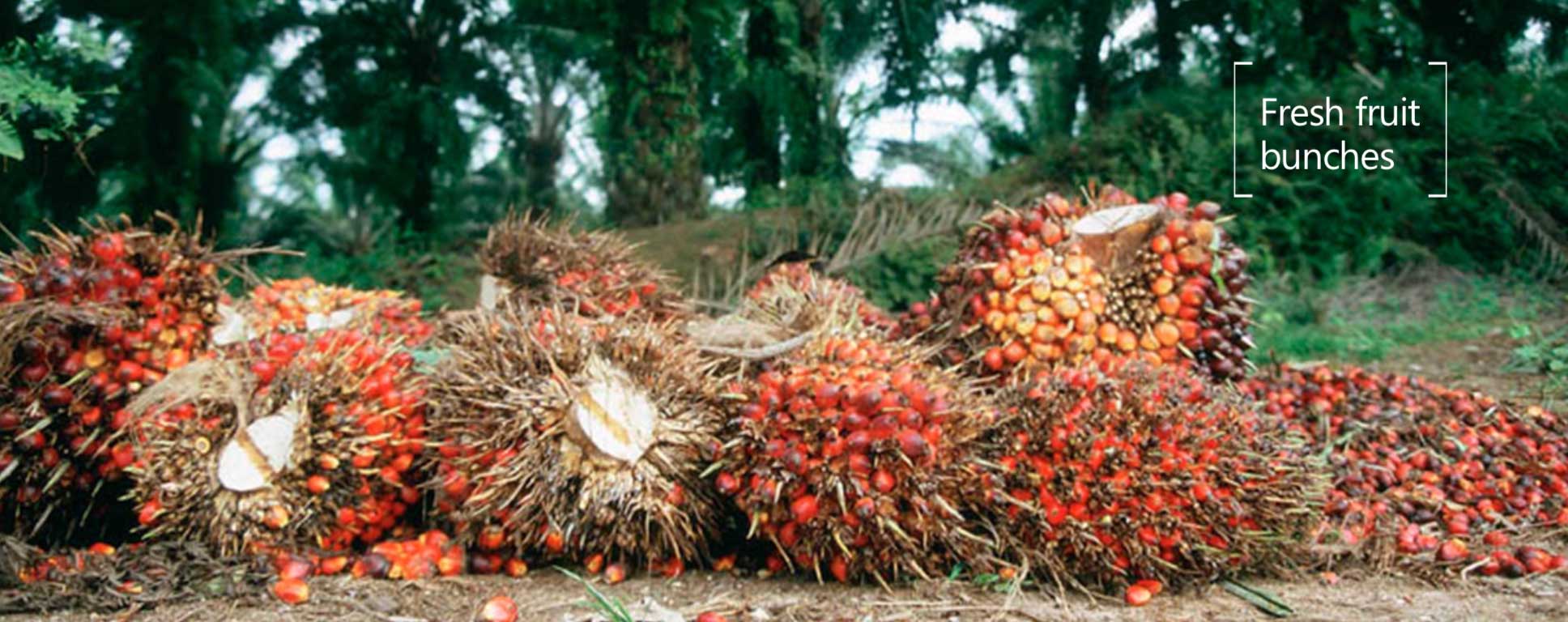 PIND conducted a survey on farmer’s access to palm oil seedlings in the Niger Delta 2016. The survey revealed that the major causes of low yields in oil palm has been the lack of access to improved seedlings and perceived high cost of good seedlings by farmers. As a result of this, there has been a proliferation of adulterated seeds which is threatening the livelihoods of oil palm farmers, preventing investments and stifling the growth in the sector. In 2017, PIND intervened with a pilot project to increase farmers’ access to high yielding quality seeds. PIND facilitated a market linkage between Okomu, a large plantation planting certified seedlings and 10 nursery operators. As a result of the linkage, Okomu and the nursery operators invested 18 million naira in certified seeds in 2017 and the nursery operators received training from Okomu on oil palm nursery management.
PIND conducted a survey on farmer’s access to palm oil seedlings in the Niger Delta 2016. The survey revealed that the major causes of low yields in oil palm has been the lack of access to improved seedlings and perceived high cost of good seedlings by farmers. As a result of this, there has been a proliferation of adulterated seeds which is threatening the livelihoods of oil palm farmers, preventing investments and stifling the growth in the sector. In 2017, PIND intervened with a pilot project to increase farmers’ access to high yielding quality seeds. PIND facilitated a market linkage between Okomu, a large plantation planting certified seedlings and 10 nursery operators. As a result of the linkage, Okomu and the nursery operators invested 18 million naira in certified seeds in 2017 and the nursery operators received training from Okomu on oil palm nursery management.Following the successful completion of the pilot, in 2018, PIND held two oil palm seed linkage workshops in Edo and Ondo States to deepen existing relationships and promote new ones among market actors like major seed producers, large oil palm plantations, nursery operators and lead farmers (from Delta, Ondo, Imo, Edo and Akwa Ibom States); and increase awareness on improved certified seeds among nursery operators and farmers.
Four seed producers (S-ATM, Ghana Sumatra, Nigeria Institute for Oil Palm Research (NIFOR), and ALLISSEE); two large oil palm plantations (PRESCO and Okomu); 29 nursery operators and 24 lead farmers established business linkages at the Edo linkage workshop. Right after the workshop, NIFOR sold 1, 500 quality seeds, ALLISSEE received booking for 7, 500 from nursery operators and farmers while others as well established patronage relationships. The Ondo State linkage workshop connected PalmElit CIRAD, a major seed producer based in France with 50 lead farmers and representatives from the Federal Ministry of Agriculture on a new improved oil palm seed. Some of the unique features of PalmElit CIRAD seed include the palm trees remaining short, and farmers will not have to climb throughout its life span and its early fruiting starting from the 13th month and producing up to 25 tons/ha from 8th year of planting.

A seedling that has not grown well in the nursery will make a poor oil palm - Lawal Samuel
“A seedling that has not grown well in the nursery will make a poor oil palm” says Lawal Samuel, a nursery operator and member of the National Association of Oil Palm Farmers who was a participant at the linkage workshops. “It’s not just having a plantation that matters, but quality plantations. We know the good quality seed, so we are trying to promote them for local farmers, for middle men and even those that want to do it in a large quantity”, he concluded. With improved business relationships engendered between stakeholders via PIND’s linkage workshops, farmers and nursery operators now have improved access to seedlings. More quality and certified seeds are expected to be purchased and planted in the year 2019.
It’s not just having a plantation that matters, but quality plantations. We know the good quality seed, so we are trying to promote them for local farmers, for middle men and even those that want to do it in a large quantity - Lawal Samuel
Download Palm Oil Report
Business Linkages
Business Service Providers (BSPs)

FACT BOX
2018: SMEs Development & Market Linkages

PIND's business linkages interventions focus on improving the business outcomes and competitiveness of small businesses. The team identifies, strengthens and works with market actors in the Micro, Small, and Medium Enterprises (MSMEs) landscape to improve access to market, finance and business support services to MSMEs in all the States in the Niger Delta.
Micro, Small and Medium-sized Enterprises (MSMEs) are the backbone of strong economies in the developing world as they accelerate the attainment of broader social-economic objectives such as poverty reduction, employment generation and wealth creation among others. In the Niger Delta, MSMEs face myriads of challenges that inhibit their ability to effectively play similar roles due to a series of problems that hinder their competitiveness and profitability.
In 2018, 14 business service providers continued to provide business capacity building support - market linkages, finance and business advisory services- in collaboration with other market actors to a vast number of Niger Delta-based micro, small and medium-scale enterprises (MSMEs) for a fee to improve their competitiveness. For example, in Bayelsa State, Zal Consulting provided business training to 109 agro-enterprises (64 female-owned) and in Ondo State, Arkshore Konsult, in partnership with SMEDAN, trained 35 agro-enterprises (12 female owned). All the trained MSMEs were recommended to the Central Bank of Nigeria (CBN) for funding and 10 of them have secured loan from the scheme during the year.
A BSP, Enwere Kolevix, based in Owerri, Imo State acknowledged the magnitude of lack of access to finance for SMEs and explained how he was able to assist a multitude of SMEs with access to finance and human capacity development. "Smallholder farmers and SMEs, are faced with bureaucratic bottlenecks of accessing finance. So we endeavour to identify and engage financial institutions that are agricultural-business-friendly. With offices in six different states, we have carried out training for many fish farmers. And this is largely due to the strengthening of our organizational capacity, especially the market system development program we had with PIND.''
Poultry service providers also reached more poultry farmers with knowledge on good poultry practices and supported new chicken processing plants to commence operations. For example, two service providers collaborated with SMEDAN and Turner Wright (an input company) to provide training on entrepreneurship skills and good poultry practices to 399 farmers (192 women) in Imo State and 86 farmers (37 women) in Ondo State.
To improve the quality of loans from financial institutions and thus reduce their high ratio of non-performing loans, the BSPs assisted 1,129 enterprises in accessing loans valued at NGN167 million ($477,142). As part of strengthening the Delta State MSME Agency’s financing scheme, the BSPs continued to monitor the performance of the 11 microfinance banks that participated in the loan process guide and recovery strategy training in 2017. Eight of these banks that have adopted the tools reported lending out NGN81.2 million ($232,000) to 938 micro-enterprises from 98 cooperatives in Delta State.
An SME owner and Managing Director of Sylvest Best-Integrated Services, a fashion design outfit have been enjoying tremendous support from PIND trained BSPs. " We are into fashion designing, and I have been into it for over 20 years. Through Bamidele, (a BSP), I was linked to GroFin, where I obtained a loan facility of 13 million to enhance the business. The impact of the loan has been tremendous. The loan has helped us employ more people. The loan is to enhance the business. We bought new equipment, and we decided to employ more people. The BSP gives me suggestion and advice regarding upgrading on how the business will grow".
GroFin is a pioneering private development finance institution specialized in financing and supporting small and growing businesses (SGBs) across Africa and the Middle East by combining medium-term loan capital and value-added business support.

By the end of 2018, these PIND-supported service providers and market actors had reached 6,194 enterprises through forums, training and other capacity strengthening activities through which, 3, 032 enterprises in the Niger Delta accessed business support, loans and new markets.By the end of 2018, these PIND- supported service providers and market actors had reached 6,194 enterprises through forums, training and other capacity strengthening activities through which, 3, 032 enterprises in the Niger Delta accessed business support, loans and new markets.
Wale Ibinaye, a BSP who came into contact with PIND in 2016 described the relationship with PIND in a not so usual manner “PIND is the strategist, BSPs are the executors based on prescription and the SMEs are the patients”.
Download Business Linkages Report
Cocoa
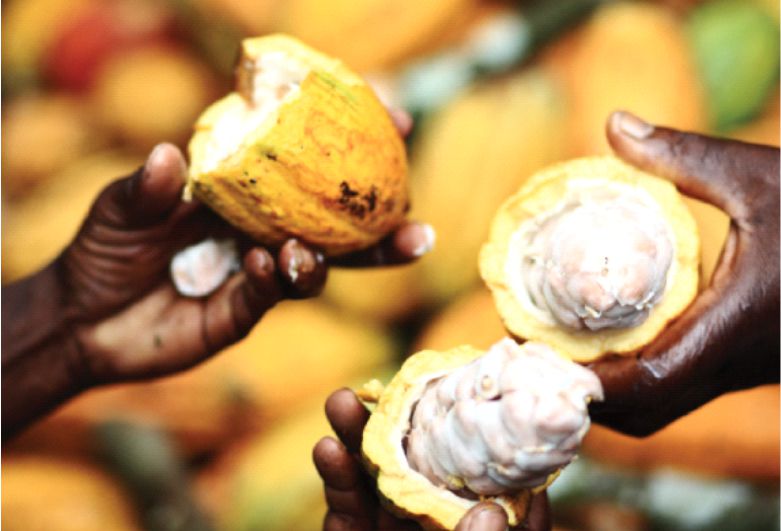
FACT BOX
2018: Cocoa
PIND recently completed a value elucidated the competitive of the region’s cocoa economy, gaps that exist and area in need of intervention. To address the systemic constraints identified in the sector, PIND has designed a series of intervention made up of the following:
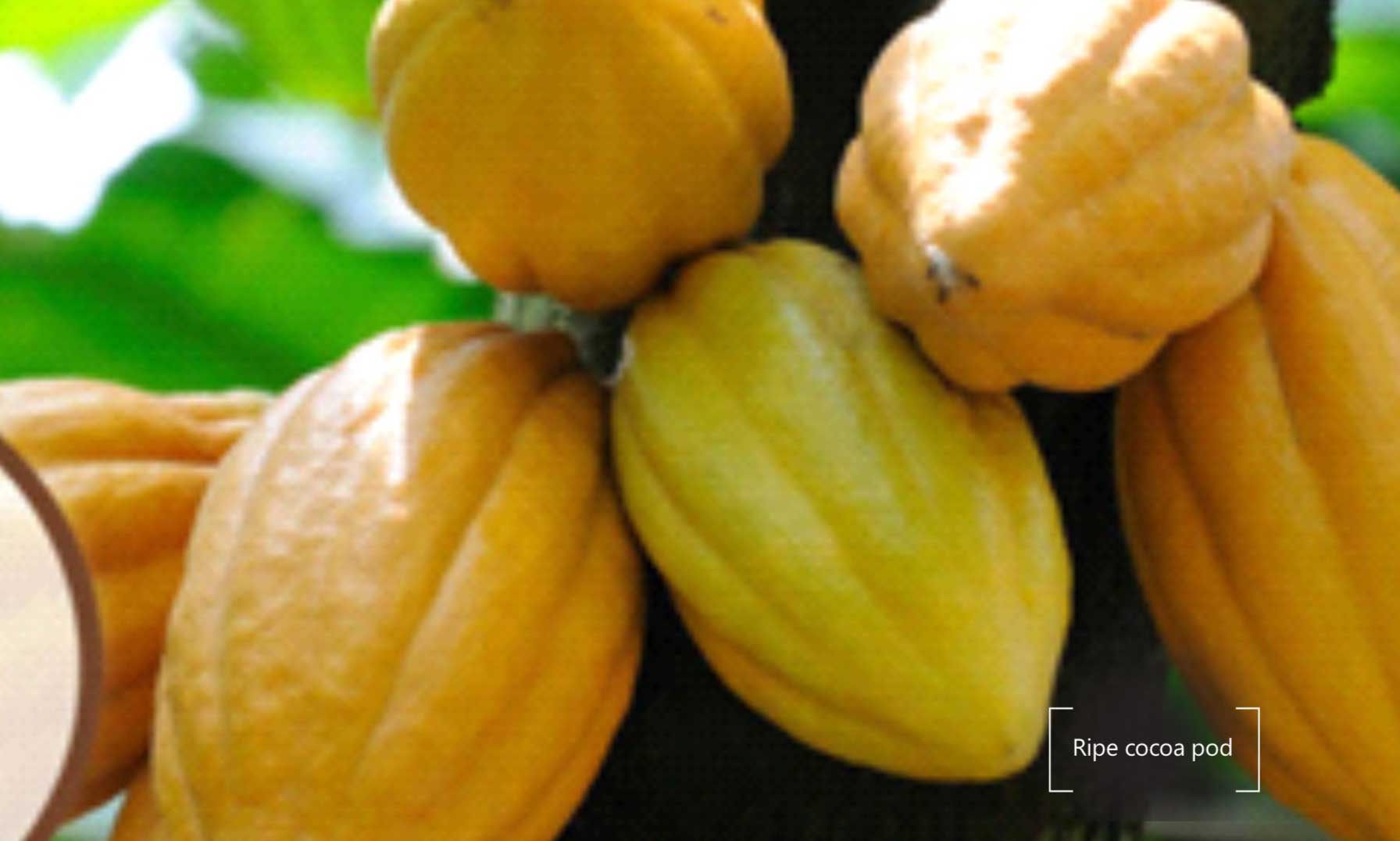
Between January and March 2018, PIND commissioned a value chain study to elucidate the competitiveness of the Region’s cocoa economy while identifying gaps and areas in need of intervention for sustainability and effective linkage with the global cocoa value chain. The study covered the key cocoa producing states in the Niger Delta which are Abia, Akwa Ibom, Cross River, and Edo States, while also meeting with other actors in Lagos, Ogun and Oyo States.
The findings from the study revealed some systemic constraints in the cocoa value chain. These include low productivity of farms arising from poor agricultural practices; predominance of older and ageing trees with low yields; absence of high-yielding seed varieties; inferior quality beans arising from poor post-harvest practices – leading to discount prices of Nigerian cocoa in the global market; and a lack of coordination among actors and functions within the value chain.
To address these challenges, PIND designed a series of interventions and explored a variety of partnership opportunities with stakeholders within the cocoa value chain such as exporters, processors, agro-input suppliers, agro equipment suppliers, and state governments to increase the availability and access to improved cocoa seed varieties (TC 1-8 types) and demonstrate good cocoa agricultural practices to cocoa farmers. The interventions are expected to lead to over 2 million improved seeds becoming available to farmers in the 2019/2020 cropping season and about 12,000 cocoa farmers increasing productivity through adoption of good agricultural practices.
Download Cocoa Report
Robust Data Resources for Evidence-Based Investments
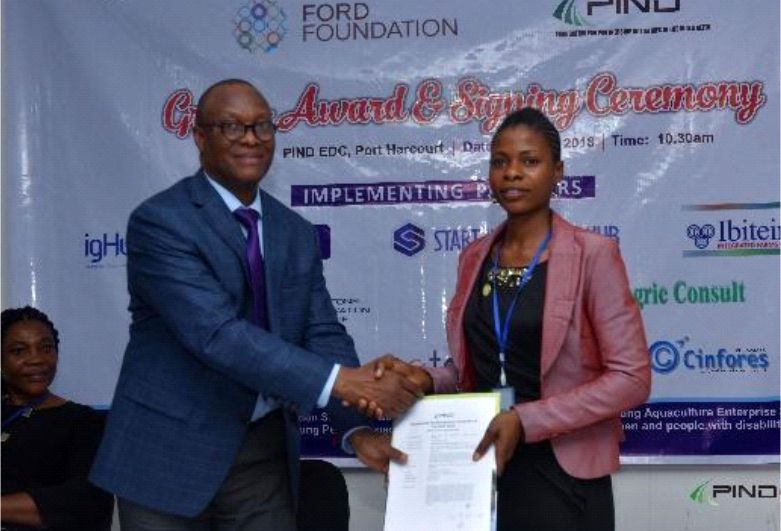
With the Niger Delta recording some of the highest unemployment rates in the country, we targeted vulnerable youth in the region with the pilot of our Niger Delta Youth Employment Pathways (NDYEP) project in Abia, Akwa Ibom and Rivers that combines the development of technical, soft, and entrepreneurship skills with a robust post-training support that will help to transition the trained youth into meaningful employment or to join a new class of job creators. Over 1,200 youth are already enrolled in this project.
FACT BOX
2018: Piloting Youth Employment Model

In 2017, PIND, with support from Ford Foundation, initiated the Niger Delta Youth Employment Pathways (NDYEP) Project to actively target youth in Abia, Akwa Ibom and Rivers states that entails building the capacity of the community of players in the youth employment ecosystem on models for stimulating jobs and income for youth through the use of data for decision-making and matching skills supply to market demand and opportunities.
In 2018, we kicked off the project pilot.
PIND’s Human Capacity Development for Youth Employment Activities in 2018
Data Resources
In 2018, to provide stakeholders with information on the actual need within the labor market, we conducted a labor market assessment in Akwa Ibom, Rivers and Abia States to understand how the unemployment market functions and determine specific occupations and skills set in demand, technical and soft skills that are being supplied and how they are being delivered. Top line findings from the labor market assessment showed a severe mismatch between skills available and labor market requirements.
Platform for Linkages
 To further coordination and collaboration, we set up a Project Advisory Committee drawn from a broad group of eight stakeholder organizations to support implementation of NDYEP. The membership includes representatives of PIND; Ford Foundation; Niger Delta Development Commission (NDDC); National Board for Technical Education (NBTE); Port Harcourt Chamber of Commerce, Industry, Mines and Agriculture; Abia State Ministry of Small and Medium Enterprise Development; the Ministry of Youth Development in Rivers and Akwa Ibom States.
To further coordination and collaboration, we set up a Project Advisory Committee drawn from a broad group of eight stakeholder organizations to support implementation of NDYEP. The membership includes representatives of PIND; Ford Foundation; Niger Delta Development Commission (NDDC); National Board for Technical Education (NBTE); Port Harcourt Chamber of Commerce, Industry, Mines and Agriculture; Abia State Ministry of Small and Medium Enterprise Development; the Ministry of Youth Development in Rivers and Akwa Ibom States.
Financial resource through small grants
Following a competitive call for proposals in July 2018, PIND selected nine eligible organizations as implementing partners for the project and empowered them with financial grants to design and deliver short-term skills training to 1,000 youth and facilitate job/enterprise linkage in ICT, construction and aquaculture for at least 40% of the youth
Competency-focused skills building
Of the target to train 1,000 youth, the implementing partners utilized the grant to provide 1,285 youth with technical and soft skills training in 2018. This included youth like Enyiaro ThankGod, who had no prior livelihood skills.
Aside jobs, as summed by Sylvia Chinwenda Nwito, one of our youth trainees in River State the soft skills training by the partners is inspiring mind set changes and positive aspirations among young people: ‘'What has changed, number one is job offers. Yes, then I beg them to get into a company because I didn't have skills, but now, I am actually getting job offers to come and work as a Front End Developer for some companies here in Port Harcourt and even in Lagos. My self-esteem has gone up. I walk into a room, and I'm confident about myself, I'm no more scared, I'm not that shy girl who walked in on the first day of class".
Technical advisory support & linkage to existing resources
PIND conducted a survey on farmer’s access to palm oil seedlings in the Niger Delta 2016. The survey revealed that the major causes of low yields in oil palm has been the lack of access to improved seedlings and perceived high cost of good seedlings by farmers. As a result of this, there has been a proliferation of adulterated seeds which is threatening the livelihoods of oil palm farmers, preventing investments and stifling the growth in the sector. In 2017, PIND intervened with a pilot project to increase farmers’ access to high yielding quality seeds. PIND facilitated a market linkage between Okomu, a large plantation planting certified seedlings and 10 nursery operators. As a result of the linkage, Okomu and the nursery operators invested 18 million naira in certified seeds in 2017 and the nursery operators received training from Okomu on oil palm nursery management.
As part of our capacity development, the Foundation guided the implementing organizations on how to mainstream gender and social inclusion in their youth development activities, setting a target for them to reach and include at least 40% of women, youth living with disabilities, and the rural youth into the program. Israel Yusuf, an implementing partner in the aquaculture sector has had his capacity built in this regard and has used the skill to ensure economic opportunities for youth living with disabilities
Out of over 1,285 youth trained in 2018, the implementing  partners ensured 442 were young women, and another 65 were youth living with disabilities. Lucky Omote is one of the persons living with a disability who benefitted from the competency-based training.
partners ensured 442 were young women, and another 65 were youth living with disabilities. Lucky Omote is one of the persons living with a disability who benefitted from the competency-based training.

"I see the training as something that can provide feeding for my own family and me. When I came here I learn how to repair the phone, first thing I learned from my teacher is how to fix screen and when I got home, someone brought screen matter to me. Now I have learned how to fix the screen, I just went straight to where they are selling it and bought it, and I fixed it".
PIND’s technical advisory support built the organizational capacity of the implementing partners in youth training beyond gender and social inclusion, as we organized a 2-day learning session in November of 2018 where the implementing partners shared lessons gained from the project implementation process. We used the Forum to introduce them to the National Skills Qualification Framework (NSQF) offered by National Board for Technical Education (NBTE).
Daniel Chinagozie of IGHub, an implementing partner testifies ‘’PIND helped helps us to achieve our dreams in a better structured way, because we properly developed a curriculum, we got in experts, they sat down and did curriculum development for us. The partnership with PIND has given us another dimension for our training department’’ said Blessing Johnson Nwankwae of Cinfores, another implementing partner ‘’I was discussing with my Managing Director yesterday during a business meeting, I told him the relationship with PIND has opened my eyes to the understanding that our training department will function as a business unit of its own as it were, as an organization of its own’’.
Post-training support
Many traditional skills acquisition programs fail to deliver sustainable results because they do not pay attention to what happens post training. From the onset in 2018, we assisted our implementing partners to incorporate a robust infrastructure for post-training support that would assist young entrepreneurs to navigate around the harsh conditions of the business world. The support consists of business advisory services, market linkages and access to finance both as investment or working capital for growth and expansion.
Though the training phase is still on, some implementing partners have begun using their new knowledge to take actions to move their trainees into placements or entrepreneurship as part of the post training support. Innovation Growth Hub in Abia State has enlisted 35 of their participants as support trainers on Facebook, while Clintonel Innovation Centre, Abia State and Start Hub Tech in Akwa Ibom are planning to host a job fair and to deploy a reasonable percentage of their participants to various companies as interns.
By 2018 year-end, the organizations were rounding up the training phase of the pilot, and intensifying their search for internships, job linkages and entrepreneurship development for the trained youth in 2019.
Download Rubust Data Report
Footprints in the Coastal Communities of the Niger Delta
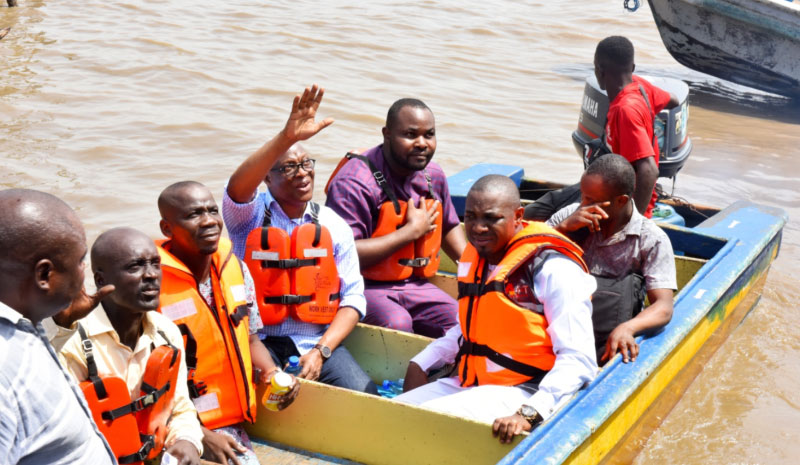
Inclusive human capital development is important to us! In 2018, we deliberately scaled our reach to ensure underserved communities in the region’s hard to reach communities in Delta, Bayelsa and Ondo States benefit more from economic growth interventions, particularly in promoting the use improved fish smoking Chorkor ovens and alternative energy technologies for off-grid communities using Energy Cabins to spur development innovations
Appropriate Technologies
PIND received the 2018 Nigerian Energy Award in recognition of our achievements in the area of clean energy, energy efficiency and sustainability in energy efficiency. PIND was also featured prominently as a key national delegate at the 8th Nigeria Alternative Energy Expo (NAEE) themed ‘Liberating Economic Drive with Clean Energy’ and hosted an exhibition stand showcasing our supported appropriate technology (AT) products.
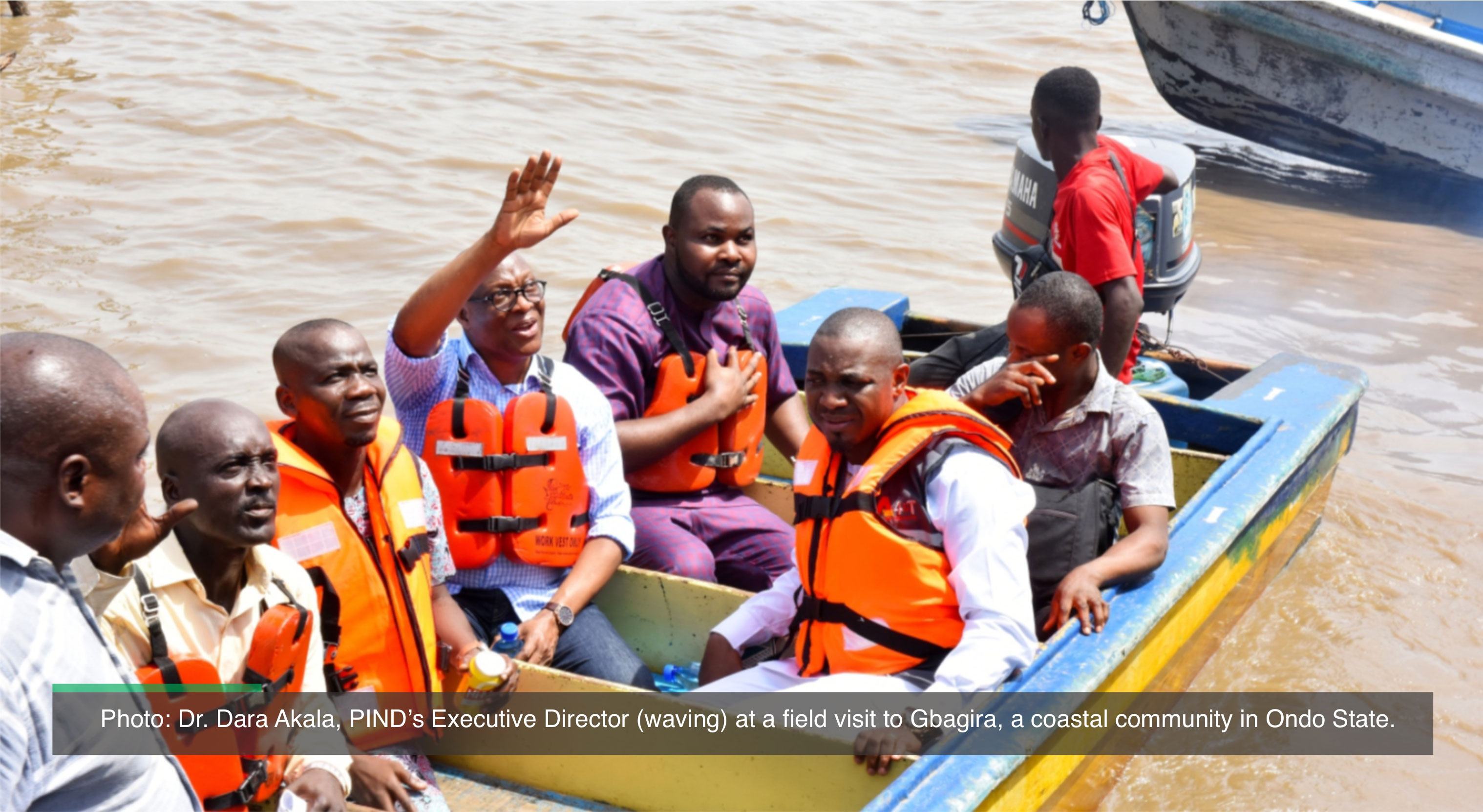
Our human capacity investment will not be inclusive if it only involves readily accessible people. The riverine and coastal areas of the Niger Delta are often described as steep terrain to work in because unlike in the upland, they are harder to traverse as they could not be accessed by road and travelling can be hours of a bumpy and sometimes scary ride in a boat on rough waters, with enormous logistics challenges. And hence they experience limited access to development opportunities. There are hundreds of local communities located along the coastline of Niger Delta.
In 2018, we deliberately scaled our reach to ensure underserved communities in the region benefit more from economic growth interventions, particularly in promoting the use of appropriate technologies to spur development innovations.
Demonstrations of Chorkor oven get to coastal communities in Bayelsa and Ondo States:
Smoked fish has fully developed as an alternative market to fresh fish, and fish smoking is a primary occupation for 80% of women across the coastline of the riverine communities of the Niger Delta. Women spend hours and sometimes days smoking fish with drums which consume firewood, time and exposes them to burns, smoke inhalation and carcinogenic material. Improved fish smoking ovens are appropriate technologies that can raise income, living standards and quality of life as they reduce fuel cost by 40%, saves time by 37% and reduce health hazards. In 2018, and led by its trained service providers, the Foundation expanded the demonstration of two improved fish smoking technologies, the chorkor oven and smoking kilns, into the riverine communities in Bayelsa and Ondo States that reached over 1,500 women
The Chorkor oven, constructed with local materials, is a relatively low cost, effective and safe equipment used for drying fish. It is fuel efficient, healthier to use, and produces a high volume of better quality smoked fish. Starting in 2014, we have been pioneering the use of the Chorkor oven in upland fish farming clusters in the region.
And this year, as part of effort to spread its benefits to the hard to reach communities, we trained 153 fish smokers and processors (76 women) from the remote coastal communities in Bayelsa and Ondo States on how to construct and use the Chorkor oven which spurred interest in its use for business by the processors. Using their newly gained skill, women fish processors in the two States have begun using Chorkor ovens by the end of 2018. Their adoption of Chorkor ovens has helped these women to process large quantities of fish with less cost compared to the traditional drum method, thereby increasing sales and incomes of these women within a shorter timeframe. This was also an added opportunity for the local masons and red clay brick makers, to sell the Chorkor oven at different sizes and height to fish smokers.
Christiana Omoyele a fish smoker in Awoye, - a hard to reach riverine community in Ondo State shared her experience of adoption of the Chorkor oven
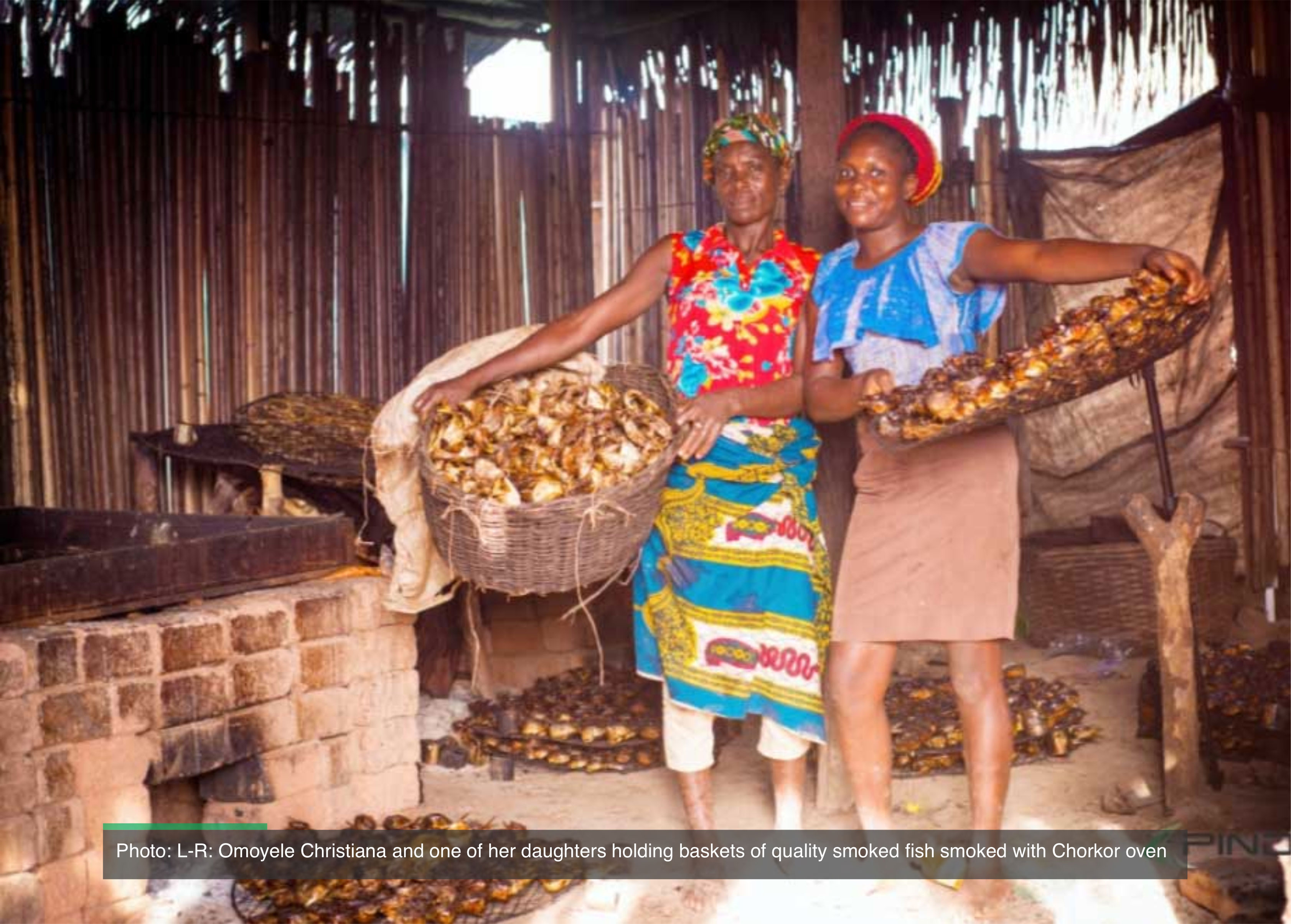 "I have 12 daughters working with me, and I've been in this fish smoking business for about 40 years. I prefer the Chorkor Oven. It is good for us. The old dryer (traditional dish smoking drum) uses plenty of firewood, but the Chorkor oven doesn’t use much. You know it is the one that doesn’t use much wood that we would like. If you just use small firewood with the Chorkor oven, the fish is ready. Because we spend a lot of money buying firewood and firewood is expensive here. The Chorkor oven is also stronger as you can mount several levels of fish, and nothing will go wrong because the block is strong. But for the old one, if you load too much fish, it will collapse".
"I have 12 daughters working with me, and I've been in this fish smoking business for about 40 years. I prefer the Chorkor Oven. It is good for us. The old dryer (traditional dish smoking drum) uses plenty of firewood, but the Chorkor oven doesn’t use much. You know it is the one that doesn’t use much wood that we would like. If you just use small firewood with the Chorkor oven, the fish is ready. Because we spend a lot of money buying firewood and firewood is expensive here. The Chorkor oven is also stronger as you can mount several levels of fish, and nothing will go wrong because the block is strong. But for the old one, if you load too much fish, it will collapse".WATCH CHRISTINA OMOYELE’S STORY
Exploring Appropriate Transportation for Difficult Terrains of Niger Delta
While the Chorkor oven demonstrates excellent value as a pro-poor technology for fish smoking, there is a high cost of boat haulage transport and extended supply chain involved in moving bricks for building Chorkor oven in riverine communities. To be cost-competitive, bricks for the Chorkor oven have to be procured close to the location where they will be utilized. In the reporting year, we began exploring more cost-effective transport options for not just the bricks for the Chorkor oven but also for other farm products from smallholder farmers in this hard to reach coastal communities.
Through field trials and assessments, we discovered a last-mile transport solution (AgRover) that could transport farm products more efficiently over challenging terrain and bad road networks at lower costs to both smallholder farmers and transport service providers using a ‘rental' or ‘lease-to-own' model.
 The assessment was done in collaboration with cocoa farmers in Ondo State, Conservation Alliance Nigeria (CA-NIG) – a local organization, and Mobile Agricultural Power Solutions Limited (MAPS) – the equipment manufacturer. If successfully piloted, brick makers within close proximity to the riverine communities can be trained to produce and transport bricks to the fish processors within affordable margins.
The assessment was done in collaboration with cocoa farmers in Ondo State, Conservation Alliance Nigeria (CA-NIG) – a local organization, and Mobile Agricultural Power Solutions Limited (MAPS) – the equipment manufacturer. If successfully piloted, brick makers within close proximity to the riverine communities can be trained to produce and transport bricks to the fish processors within affordable margins.Powering Coastal Communities with Energy Efficient Technologies
 It is close to impossible to overstate the role of reliable and affordable power; it improves lives and supports people in their quest to live better or even escape poverty in the first place. But energy access remains elusive to many other hard to reach coastal communities in the region. Our Energy Efficiency and Renewable (EER) initiative assessed the potential and readiness of four coastal communities Ilaje local government area of Ondo State that are unserved with electricity – Awoye, Molutehin, Gbagira and Mese- to partner on a one-year private sector-led pilot of a commercial mini-grid.
It is close to impossible to overstate the role of reliable and affordable power; it improves lives and supports people in their quest to live better or even escape poverty in the first place. But energy access remains elusive to many other hard to reach coastal communities in the region. Our Energy Efficiency and Renewable (EER) initiative assessed the potential and readiness of four coastal communities Ilaje local government area of Ondo State that are unserved with electricity – Awoye, Molutehin, Gbagira and Mese- to partner on a one-year private sector-led pilot of a commercial mini-grid. Guided by the outcome of the assessment, PIND facilitated the leadership and people of Gbagira community to sign a power purchase agreement with A4&T Power Solutions, a private enterprise based in Lagos State, to pilot one-year commercial mini-grid using Energy Cabins. The Energy Cabins will ensure the availability of the productive energy essential for unlocking the full potential of businesses in the community. This pilot is to be launched in 2019 with an aggregate electricity demand of 15kWh.
With the implementation, large swathes of agrarian and fishing communities will benefit from reliable and affordable energy for development as they could adopt electricity-dependent technologies for processing, refrigeration and preservation of their products. Newer service industries will also likely emerge – economic activities like sewing, e-money services, and communal TV viewing centers will become alternative venture areas to support community living and quality of life.
We will do more in hard to reach areas in 2019, taking lessons from our work in 2018 and leveraging existing opportunities identified.
Besides our work in the hard to reach communities, as part of our Appropriate Technology Development (ATED) Centre’s program on energy efficiency, PIND trained lecturers from five universities (University of Benin; Federal University of Technology, Akure; Ambrose Alli University, Ekpoma; Rivers State University of Science and Technology; and Abia State University) in the Niger Delta on energy efficiency in buildings and renewable energy alternatives in September, 2018. The Centre also hosted numerous stakeholder groups of over 300 persons in different demonstration events and workshops on appropriate technologies. Overall, the ATED Demonstration Centre recorded 456 visitors in 2018 who learned about new appropriate technologies adapted to suit local needs.

PIND received the 2018 Nigerian Energy Award in recognition of our achievements in the area of clean energy, energy efficiency and sustainability in energy efficiency. PIND was also featured prominently as a key national delegate at the 8th Nigeria Alternative Energy Expo (NAEE) themed ‘Liberating Economic Drive with Clean Energy’ and hosted an exhibition stand showcasing our supported appropriate technology (AT) products.
Download Footprints Report
Peace Building Program
Expertise in the Network Development Approach to Peace Building
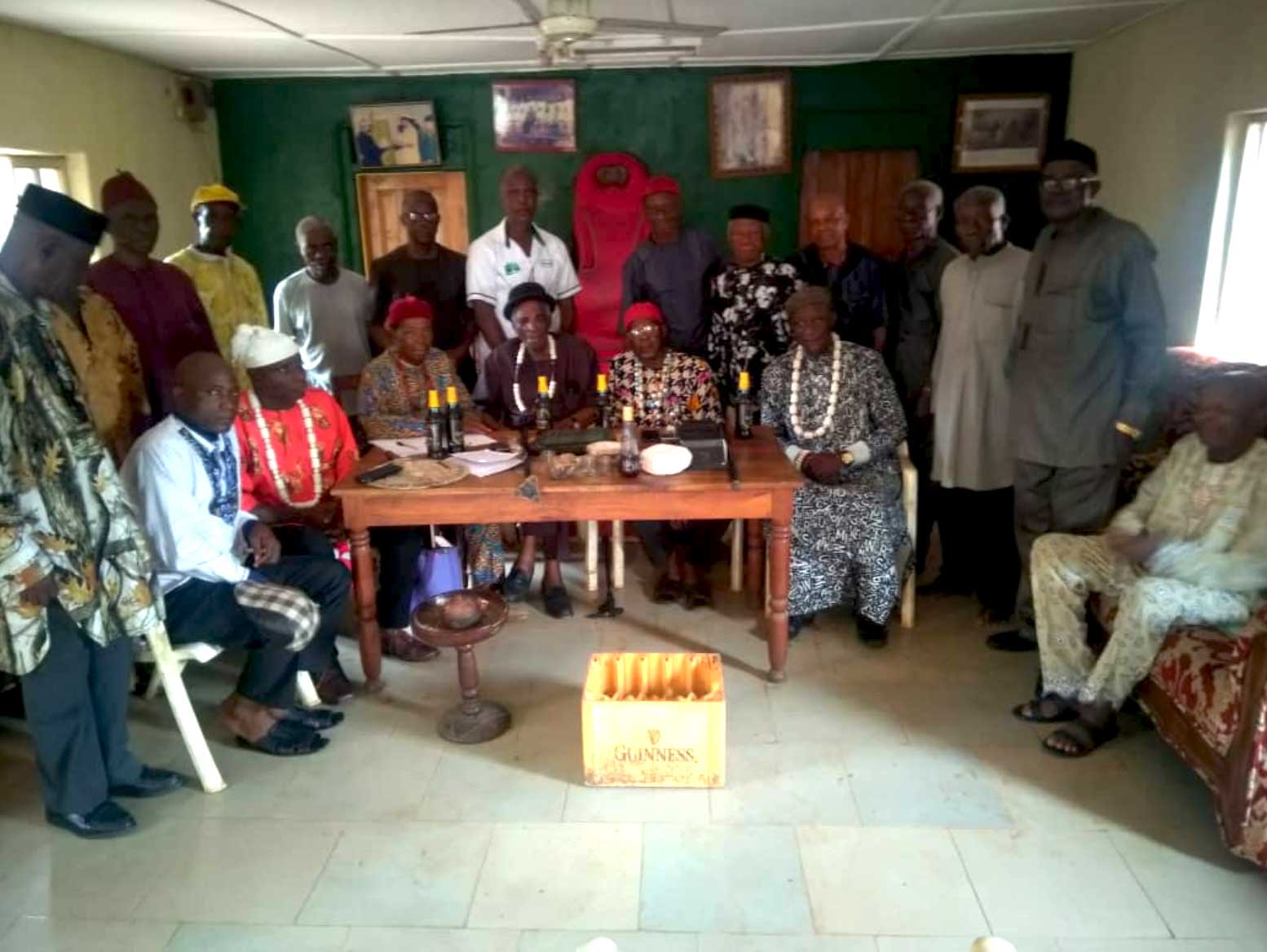
The Foundation also responded to human capital priorities in the peacebuilding sector by consolidating and institutionalizing the capacity of the Partners for Peace (P4P) Network, a self-sustaining membership organization for conflict resolution and mitigation in the Niger Delta in 2018.
FACT BOX
2018: Fostering Stability
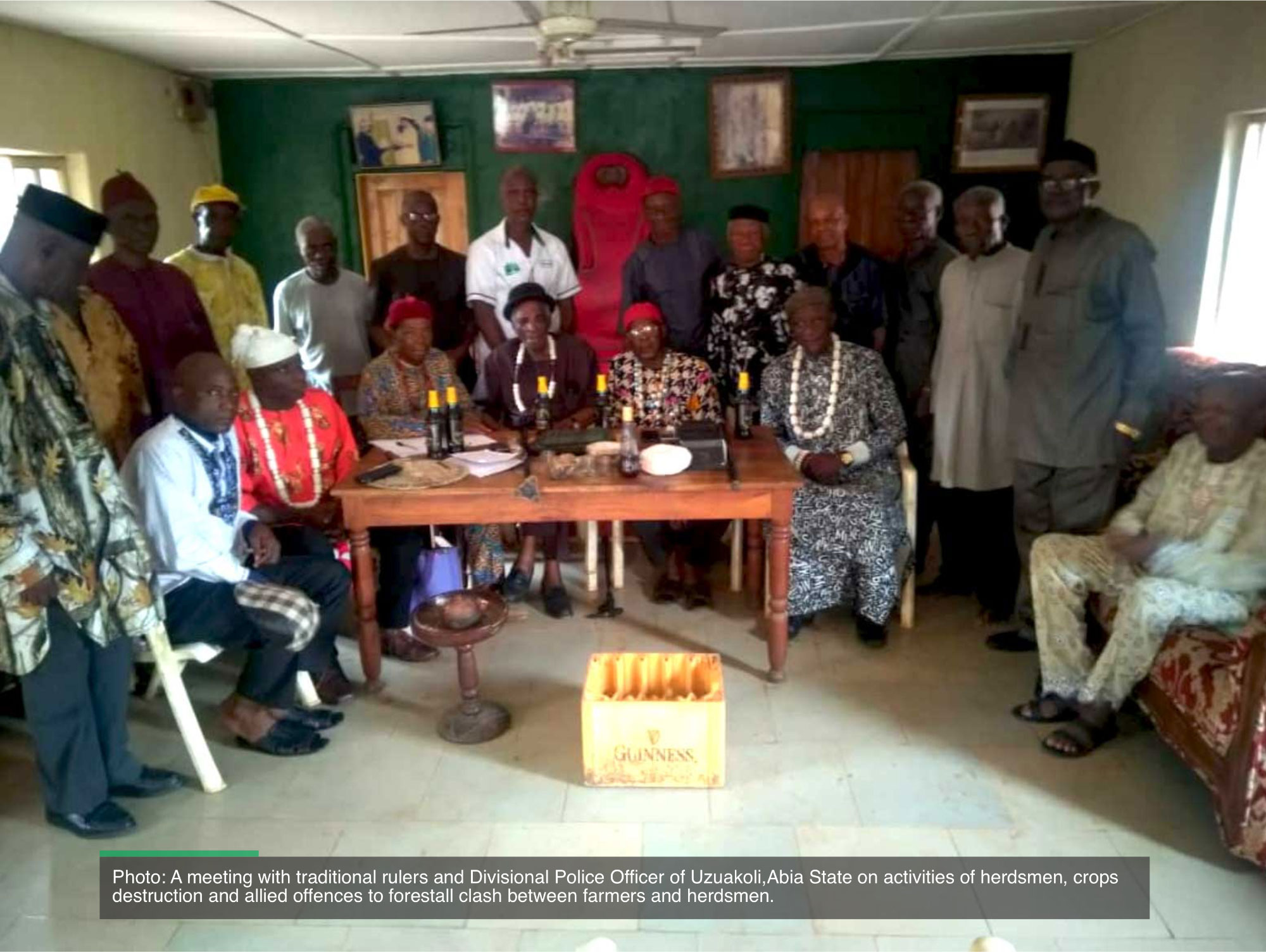
Expertise in the Network Development Approach to Peace Building
Through the platform for collective actions, skills, data and resources that we provided to them, the over belonging to the Network have helped to prevent and mitigate more than incidents till date using a wide range of peacebuilding activities which included conflict early warning, conflict prevention, conflict management, and conflict resolution. To date, there are out of a total of 185 LGAs, making P4P truly region-wide.
In the reporting period, PIND provided technical assistance to the Delta State P4P Chapter to establish the Warri Multi-Stakeholder (MSP) Platform where stakeholders from the Itsekiri and Ijaw ethnic groups in Warri local government areas can dialogue on the deeper drivers of violent conflict and ways to resolve those issues
Since 2013, PIND has been promoting synergy and cooperation among peace actors in the Delta region through the Partners for Peace project – a unique approach to peacebuilding designed to build social capital around peace in the region. In 2018 we promoted peacebuilding and conflict mitigation as a collective responsibility and collective action requiring multiple players, men and women at the community level.
From the outset, we observed that not many people were motivated to be peace actors in their various communities as there were no incentives for them to promote peace. The community-based organizations similarly lacked the capacity for conflict analysis and mitigation; their peacebuilding activities were not coordinated, and there were low awareness and voice for CBOs and individuals promoting peace in the region. Their lack of conflict management and mediation skills fueled a sense of helplessness in the face of systematic violence in conflict-affected areas.
A Platform for Peace Actors
But that situation is changing now. P4P provides platforms for continuous capacity building and mentoring for members. P4P covers a wide range of activities on conflict early warning, conflict prevention, conflict management, conflict resolution, and peacebuilding. The network has open membership. That is, it is not restricted to persons, CSOs and organizations that have peace and conflict experience.
The platform accommodates people without peacebuilding experience but has a passion for peacebuilding. Agata Osueke, the Edo State P4P chapter Coordinator, describes P4P as ‘‘a network of persons and organizations of like minds coming together to take formidable peace actions.
To increase the membership of P4P network, the State chapters established 20 P4P subchapters. These are geo-located in the following local government areas and States: Etim Ekpo and Oron local government areas in Akwa Ibom State; Bakasi and Akampa local government areas in Cross River State; Bendel, Ikuano, Ugwunabor, Ukwa West, Umuahia North and Umuahia South local government areas in Abia State; Ekeremor, Ogia and Nembe local government areas in Bayelsa State. Others are in Akoko Edo, Owan East and Etsako West local government areas in Edo State; Warri South and Bomadi local government areas in Delta State; and Arogbo and Apoi communities in Ese-Odo local government areas in Ondo State. The newly established subchapters focused on interventions that mitigate and or resolve conflicts within their communities. With the establishment of these subchapters, the P4P network is increasing its membership and reach in the villages. Now that there are 9 functioning State Chapters, by drilling down to the LGA level to inaugurate and train Sub-Chapters, the network can reach outside of the main urban centers. To date, there are Subchapters in 99 out of a total of 185 LGAs, making P4P truly region-wide.
Local peace agents in the Network continued to participate in the Niger Delta Peace and Security Network (NDPSN) facilitated by PIND and in the Peace and Security Network (PSN) at the national level. In 2018, through the NDPSN and PSN, they contributed to a PIND-led development of election scenario plans for Abia, Akwa Ibom, Cross River, Imo and Rivers States. These States were identified as hotspots for the 2019 elections. The scenario plans provided vital members of the PSN with the right information to formulate their strategy for addressing violent conflicts in the upcoming 2019 elections. PIND also led the working group to develop a plan for engaging with key stakeholders on the 2019 elections.
Skills for Peacebuilding
To continuously equip volunteers with the relevant skills for peacebuilding and conflict resolution is crucial in sustaining P4P. The Leadership and Volunteerism module was established as a compulsory module for new entrants to the P4P network. We built the capacity of ordinary citizens who are members of the P4P and highlighted the “collective action approach”. The logic of collective action for peacebuilding became popular and peace volunteerism deepened in Niger Delta communities.
Atakpa Effiong, a volunteer in Akwa Ibom, who is a retired civil servant, points out that they did not have a structured means of actively engaging in peacebuilding before P4P was established. According to Effiong, P4P made it easier for volunteers to come together to deliberate on issues facing their communities. ‘‘People may have ideas, and if there is no organized forum for them to put the ideas into use, the ideas die with them,” Effiong says. "P4P, that is the forum we have used to put our ideas into practice.''
In 2018, we complemented training by implementing a combination of mutually reinforcing approaches that provided a fertile ground for collaborative actions to germinate. Examples include providing an opportunity for members to actively participate in peacebuilding activities, ensuring equal participation of men and women and allowing P4P members to jointly design and implement peace interventions. Finally, PIND successfully created and launched CAPABLE training modules for Peace Building to strengthen the impacts of peace agents and organizations in the Niger Delta.
PIND's work to ensure that new and existing peace agents were better equipped to engage in interventions resulted in the conduct of 40 responses to mitigate and resolve conflicts in communities by the P4P Network in 2018. One of such is P4P Network’s intervention in Arochukwu and Ohafia local government areas of Abia State where they prevailed on farmers and herdsmen to improve communication and report infractions to enable cordial resolutions. The quick response mitigated a potential herdsmen-farmer conflict which has claimed thousands of lives and displaced hundreds more since 1999.
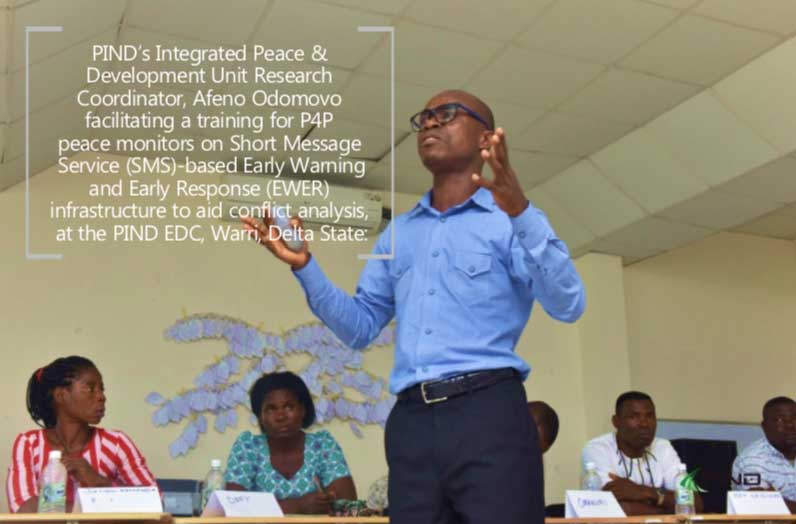
A P4P member that coordinated the response in Arochukwu attributed this feat to human capital development from PIND. "The network has developed a lot of people," he said, "where I was before and where I am is way different, and I can tell myself that I'm now an expert in conflict management, personally. Secondly, getting myself engaged in peacebuilding has enabled me to check my activities because you cannot tell people to stop fighting when you are a fighter. Before now I use to be an activist, criticize the government, criticize community stakeholders positively, you know. But right now, even if I have to criticize, I have to do it in a conflict-sensitive manner''.
Peacebuilding efforts amplified by capable local peace agents mitigated and prevented about 153 conflicts as at 2018, with new organizations and individuals self-identifying as peace agents.
The understanding of the impact of conflicts and having the skills for peacebuilding triggered affirmative action towards peace from the peace agents. This involved active mass media messaging on peace aimed at motivating more persons to take a stand for peace. For example, Akwa Ibom, Edo, Ondo and Rivers States P4P chapters continued with their peace advocacy messages on radio and television ahead of the 2019 Nigerian elections. Cumulatively, the total number of people reached with P4P facilitated media messages within and outside the Niger Delta is estimated to be 45 million.
Data for Peacebuilding - “A stitch in Time Saves Nine."
P4P peace monitors in the communities integrate and collate conflict data from across the region to our Short Message Service (SMS)-based Early Warning and Early Response (EWER) infrastructure to aid conflict analysis. The data informs a subset of the P4P called the PREVENT team that identifies conflicts that could escalate into violence and works towards preventing or mitigating them. As such, the EWER platform serves as a technological infrastructure for the P4P volunteers for sending and receiving actionable conflict information in the region. During the year, PIND organized joint workshops for the PREVENT teams from all the state chapters where the members shared lessons and best practices and reviewed strategies regarding the data collection, analysis, planning, and interventions.
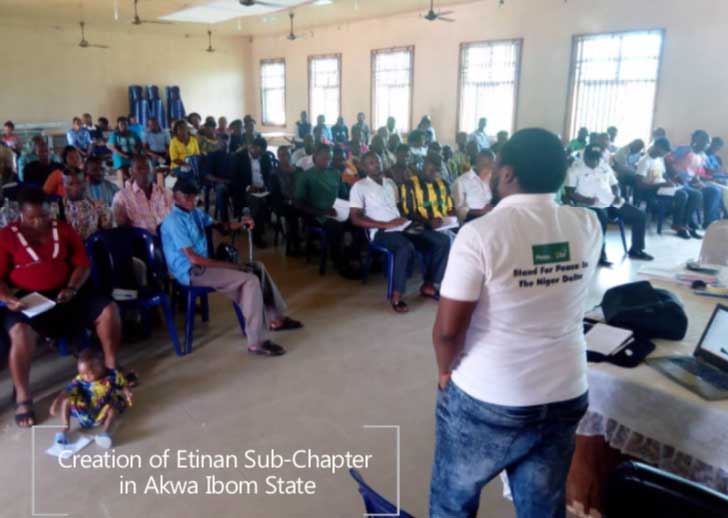
By 2018, over 11,000 data points on local conflict have been provided by the local peace agents on the EWER – making conflict risk data available for decision-making and planning. PIND used the data from the P4P monitors to develop a total of 28 conflict briefings to cover various emerging issues in the region. A survey on the effectiveness of PIND’s conflict reports and data carried out in September 2018 revealed these conflict briefings to aid conflict analysis were utilized by 64 organizations within and outside of the region. About 80 percent of these organizations are based in the Niger Delta.
Resources for Peacebuilding - Sustaining the P4P Network
During the year, PIND helped the Peace network to develop their fundraising skills, provided in-kind support, and small grants to enable them to execute their peacebuilding interventions.
Across the state chapters, the volunteers are exploring potential sources of funding for their activities.
According to the volunteer that leads the PREVENT team of Cross River State chapter, Shaabam Abdullahi, they have understood the need to diversify their funding for their long-term sustainability, and they are already brainstorming on possible means of sustaining the network. Armed with resource mobilization skills provided by PIND, the Abia State P4P members have constituted a resource mobilisation committee to scout for local and international funding sources. Beyond building the capacity of members for peacebuilding and conflict resolution, the chapters are linking the volunteers to entrepreneurship and economic empowerment programs. This, they believe, will sustain P4P as members become more empowered economically.
One crucial support in 2018 was the Warri Multi-Stakeholder (MSP) Platform: In the reporting period, PIND provided technical assistance to the Delta State P4P Chapter to establish this Forum where stakeholders from the Itsekiri and Ijaw ethnic groups in Warri local government areas can dialogue on the deeper drivers of violent conflict and ways to resolve those issues. The platform is a coordinating forum and comprises 16 members cutting across Traditional Rulers, representatives from the Delta State and respective local government areas, and community representatives from the Ijaw and Itsekiri ethnic groups.
As part of efforts to mutually forge a pathway for addressing those issues that trigger conflict among the Itsekiri and Ijaw ethnic groups, members of the Warri multi-stakeholder platform carried out seven advocacy visits in the last quarter of 2018. Visits were to the Deputy Governor of Delta State; the Chairpersons of Warri North, Warri South and Warri South-West local government areas; the Pere of Gbaramatu and Olu of Warri; as well as the Department of State Services (DSS). This initiative earned PIND an honorary by the Governor of Delta State in recognition of PIND’s invaluable leadership in promoting peace in the state.
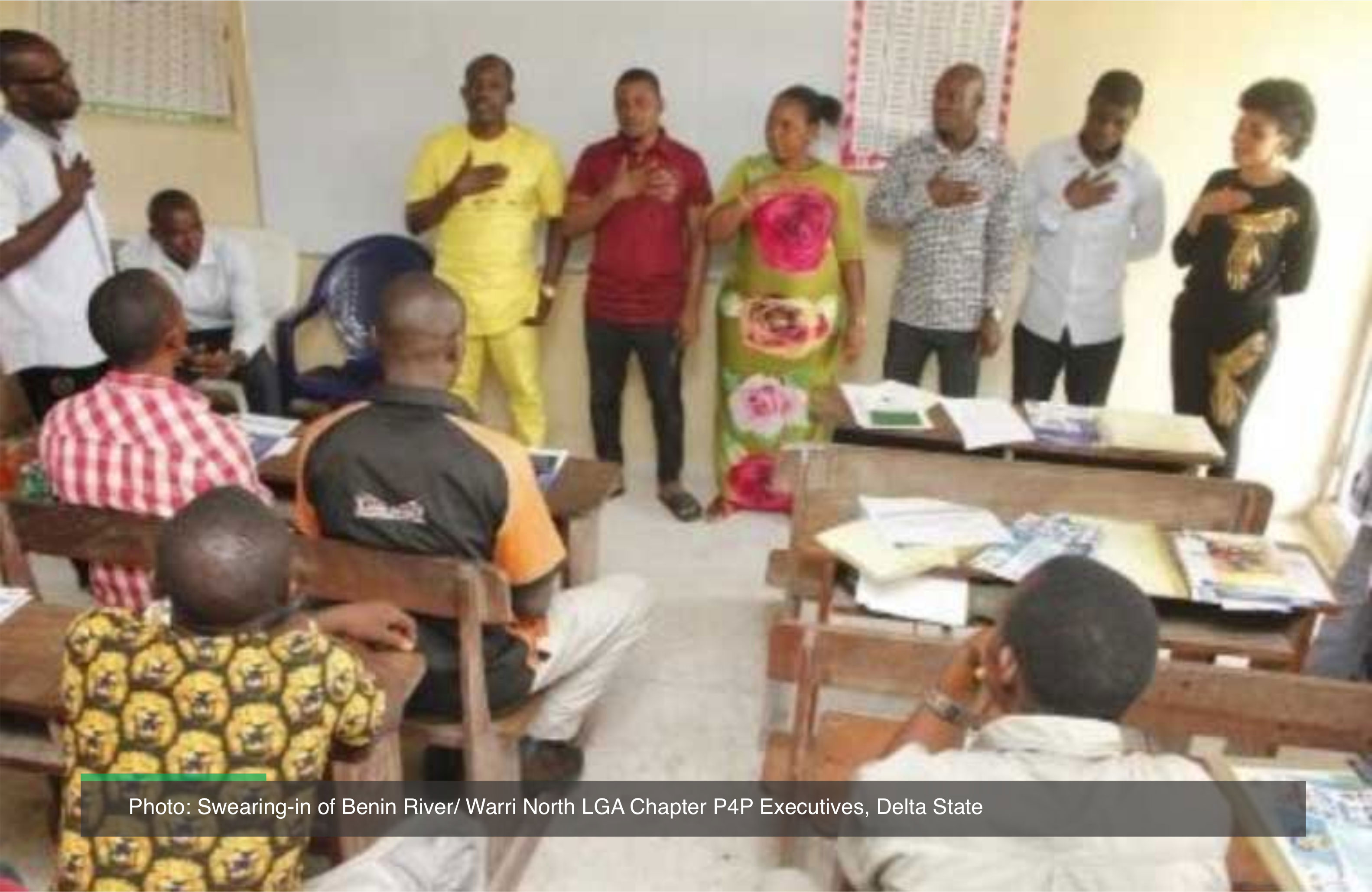
Download Peacebuilding Report
Analysis and Advocacy
Strong Convening Power
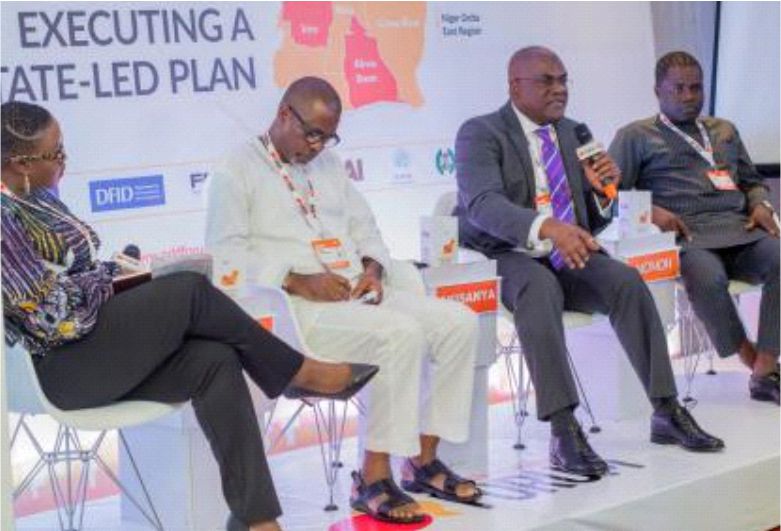
PIND has, over the years, built reputation as a neutral entity and this has enabled us to convene platforms for stakeholder dialogues and conversations on important issue
In 2018, working with select partners, we successfully convened and co-hosted seven advocacy events and meetings aimed at influencing stakeholders, building synergies/networks and strengthening capacity to initiate and drive policies and programs that will foster rapid development in the region.
NDLink, our online information and communications platform convened 19 development-oriented discussion forums on the platform that had 148 contributors and reached over 8,927 people on Twitter.
FACT BOX
2010 - 2018: Influencing Development Practice and PolicyTo serve as a convener and facilitator for development, neutrality is critical. Having all partners participate in the co- development of ideas, solutions and responsibilities is vital. And creating capability through knowledge transfer between partners fosters collective action and impact. Guided by these foundational principles, PIND has, over the years, built reputation as a neutral entity and this has enabled us to convene platforms for stakeholder dialogues and conversations on important issues that would engender positive actions to boost economic growth and reduce under-development and poverty as the significant drivers of conflict in the Niger Delta.
In 2018, working with select partners, we successfully convened and co-hosted seven advocacy events and meetings aimed at influencing stakeholders, building synergies/networks and strengthening capacity to initiate and drive policies and programs that will foster rapid development in the region. This includes the review of the Delta State agriculture policy development, Warri Economic Summit, Niger Delta Donor and Partners Coordination meetings, side event at the 24th Nigeria Economic Summit, Niger Delta Development Forum (NDDF) Roundtables, and the national and regional Peace and Security Network (PSN) meetings. Over 1,000 persons from government, civil society, private sector and others attended.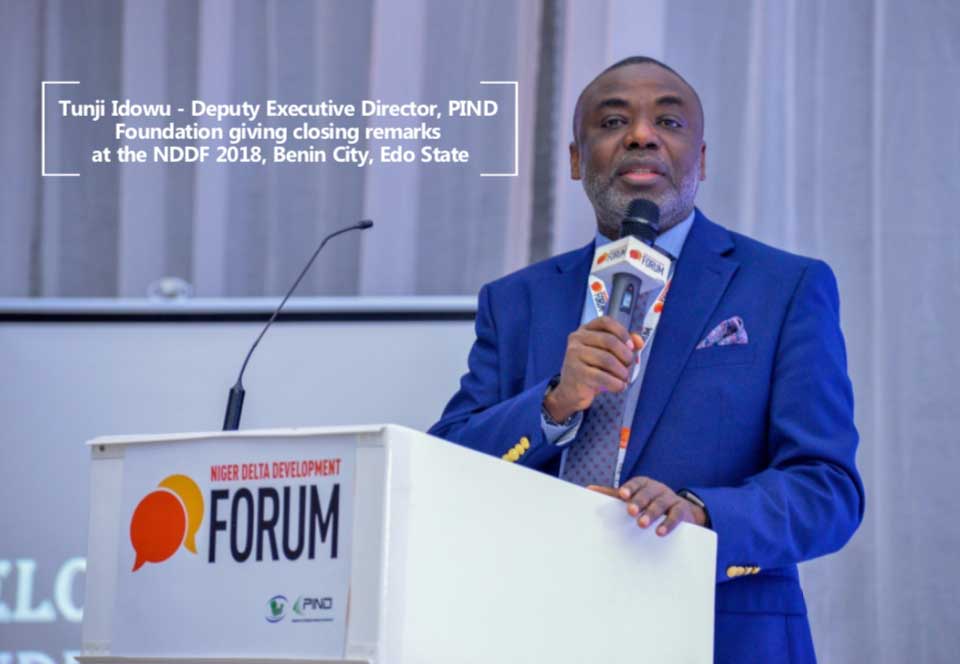
Our convening also leveraged the power of the internet for advocacy. NDLink, our information and communications platform utilizes the internet to connect stakeholders in the region. In 2018, NDLink convened 19 development-oriented discussion forums on the platform that had 148 contributors and reached over 8,927 people on Twitter.
WATCH THE HIGHLIGHTS OF THE NDDF 2018 STATE PITCHESUsing peer to peer learning approach, our 2018 annual Niger Delta Development Forum (NDDF) roundtables provided government representatives from seven States the opportunity to hone their ability in crafting long term development plan for their respective States
NDDF 2018: Building Capacity & Vision for States Long-term Development Planning

Using peer to peer learning approach, our 2018 annual Niger Delta Development Forum (NDDF) roundtables provided government representatives from seven States the opportunity to hone their ability in crafting long term development plan for their respective States.
Since inception in 2012, the Niger Delta Development Forum (NDDF) has taken steps to achieve its main objectives to create opportunities for dialogue among development actors to support new, innovative approaches for promoting economic development, building institutional capacity and promoting peace within the Niger Delta.
We have learnt that identifying the target audiences is one of the most important parts of convening stakeholders on developing an effective advocacy strategy. The 2017 edition of NDDF, “The Future in Our Hands: A State-Led Framework for Planning & Development in the Niger Delta” began targeting Niger Delta State governments to raise their awareness on the importance and approaches to long term planning in addressing the myriad of socio- economic challenges facing the region.
To stimulate more profound commitment and ownership to this agenda by the state governments, NDDF 2018 themed, “Delivering Results: Executing a State-Led Plan” was held as Roundtable events in Benin, Edo State and Port Harcourt, Rivers State. At the Roundtables, neighbouring States competed with one another for the first time for a chance to get in-kind support from development partners to develop their long-term plan. 191 key stakeholders comprising top State government officials, private sector institutions, Civil Society Organizations (CSOs), development experts and partners and individuals interested in the region participated in the Forum.
The organizations that played vital roles in ensuring the success of the Forum include European Union - Niger Delta Support Program 4, Water Aid Nigeria, BudgIT, Nigeria Economic Summit Group; Department for International Development (DFID) funded Market Development Project (MADE II) Development Alternative Inc. (DAI) and the Lagos State Ministry of Economic Planning and Budget.
first time for a chance to get in-kind support from development partners to develop their long-term plan. 191 key stakeholders comprising top State government officials, private sector institutions, Civil Society Organizations (CSOs), development experts and partners and individuals interested in the region participated in the Forum.
The organizations that played vital roles in ensuring the success of the Forum include European Union - Niger Delta Support Program 4, Water Aid Nigeria, BudgIT, Nigeria Economic Summit Group; Department for International Development (DFID) funded Market Development Project (MADE II) Development Alternative Inc. (DAI) and the Lagos State Ministry of Economic Planning and Budget.
NDDF 2018 State Governments Capacity Building Approach
Our NDDF is not just a Forum. It is a platform for human capital development of target stakeholders. For 2017 and 2018, governments were central.
Skills/Knowledge – At the 2017 NDDF, thematic subject matter experts shared importance, approaches, methodologies and thematic focuses for developing long-term plans with State government representatives and guided them to start formulating roadmaps towards this
Tools/technical assistance: Ahead of the 2018 Forum, PIND and partners shared templates and resources for developing long term plans and worked with seven states – Abia, Akwa Ibom, Bayelsa, Delta, Edo, Imo, Ondo — to use the template to develop and harmonise frameworks and vision for their long-term planning strategy.
Platforms: The 2018 NDDF roundtables served as peer-to-peer learning and lesson sharing between government and other stakeholders. Case studies of the Lagos State model of development planning, followed by a regional example using the Cross Rivers State 30- year Growth and Development Strategy (GDS) developed with support from PIND in collaboration with other partners were discussed. It was then capped off by highlighting the underlying role of the private sector to initiate, implement, and drive long- term plans successfully. States practiced ‘learning by doing' as they pitched their draft long term frameworks to their peers for feedback.
Resources: In 2019, PIND and partners plan to provide long term development experts as coaches for on the job support to the winning states to develop and launch their long term plans.
Vast Network of Partners

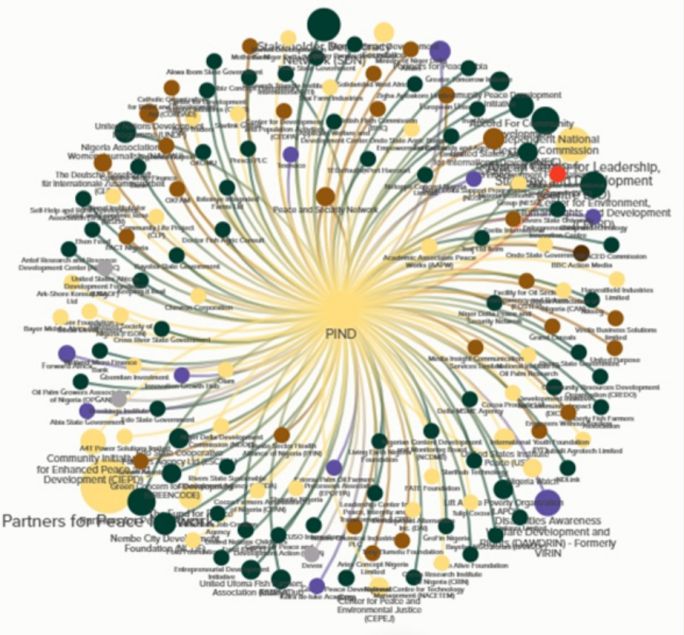
Our numerous direct and indirect partnerships have advanced human capital development for wealth creation for thousands of people in the Niger Delta.
The Direct PIND Partnership Profile As At 2018
Vast Network of Partners
 From the beginning, PIND has focused on building a robust partnership network to promote stability and economic growth in Nigeria’s Niger Delta. This is founded on our belief that no single organization can solve the problems of the region alone. However, for us, a partnership is not about contractual agreements, instead, it is about valuable opportunities to discuss, strategize, share resources and expertise and learn together and by so doing, spur the resources, innovation and creativity needed to find long-term development solutions.
From the beginning, PIND has focused on building a robust partnership network to promote stability and economic growth in Nigeria’s Niger Delta. This is founded on our belief that no single organization can solve the problems of the region alone. However, for us, a partnership is not about contractual agreements, instead, it is about valuable opportunities to discuss, strategize, share resources and expertise and learn together and by so doing, spur the resources, innovation and creativity needed to find long-term development solutions.
PIND has been effective at positioning itself as a convener, facilitator, and catalyst for development in the Niger Delta. In 2018 alone, we fostered 42 new partnerships with donors, investors, government agencies, local businesses, civil society organizations and communities. In 2018, we undertook a Social Network Analysis (SNA) to better understand the connections in our networks and its value.
The SNA found that as at year-end 2018, PIND is formally connected to about 150 regional, national and international organizations in direct partnerships that have advanced human capital development for wealth creation for thousands of people in the Niger Delta.
Sometimes, we facilitate partnership networks that are key to creating connections that enable individuals to access the critical tools for success – information, exchanges of ideas, relationships and resources. In 2017, we catalyzed the Niger Delta Donor and Partners Coordination Forum that seeks to drive better coordination and harmonization of development efforts to guard against duplication of interventions in the region. The Forum held two strategic information sharing meetings during 2018 and through this Forum, we are networked to over 14 organizations. We pioneered formation of the national Peace and Security Network (PSN) and its regional version, the Niger Delta PSN, both of which continued to hold knowledge sharing and strategy sessions on peace in 2018. Through the national PSN, we are networked to over 180 organizations, including CSOs, donors, governments, and local businesses.
In other instances, we facilitate connections between our created partnership networks and other individuals, 2018, a cumulative of over 650 organizations and 7,500 individuals connected to the self-organizing Partners for Peace Network we created as peace agents. PIND’s online network platform – NDLink – connected 3,985 people and professionals as its registered members focused on Niger Delta development. These members accessed current projects in the region, job opportunities and articles of interest through the platform in 2018. The 2018 SNA further found that through our direct and indirect relationships, PIND is connected to over 620 organizations – and we are leveraging these diverse connections to influence greater development impact. Beyond leverage, the SNA tells more about our sphere of influence as it shows that we are connected to other well connected organizations and we know and understand 'whoknowswhoandwhomightknowwhat' -andassuch we can reach many organizations directly, can broker relationships between other organizations by providing easy entry points, we can serve as a bridge connecting two other organizations and we can easily convene or rally organizations, businesses and government entities. In many stakeholders together around a common issue.
PIND’s direct and indirect connections - as at 2018
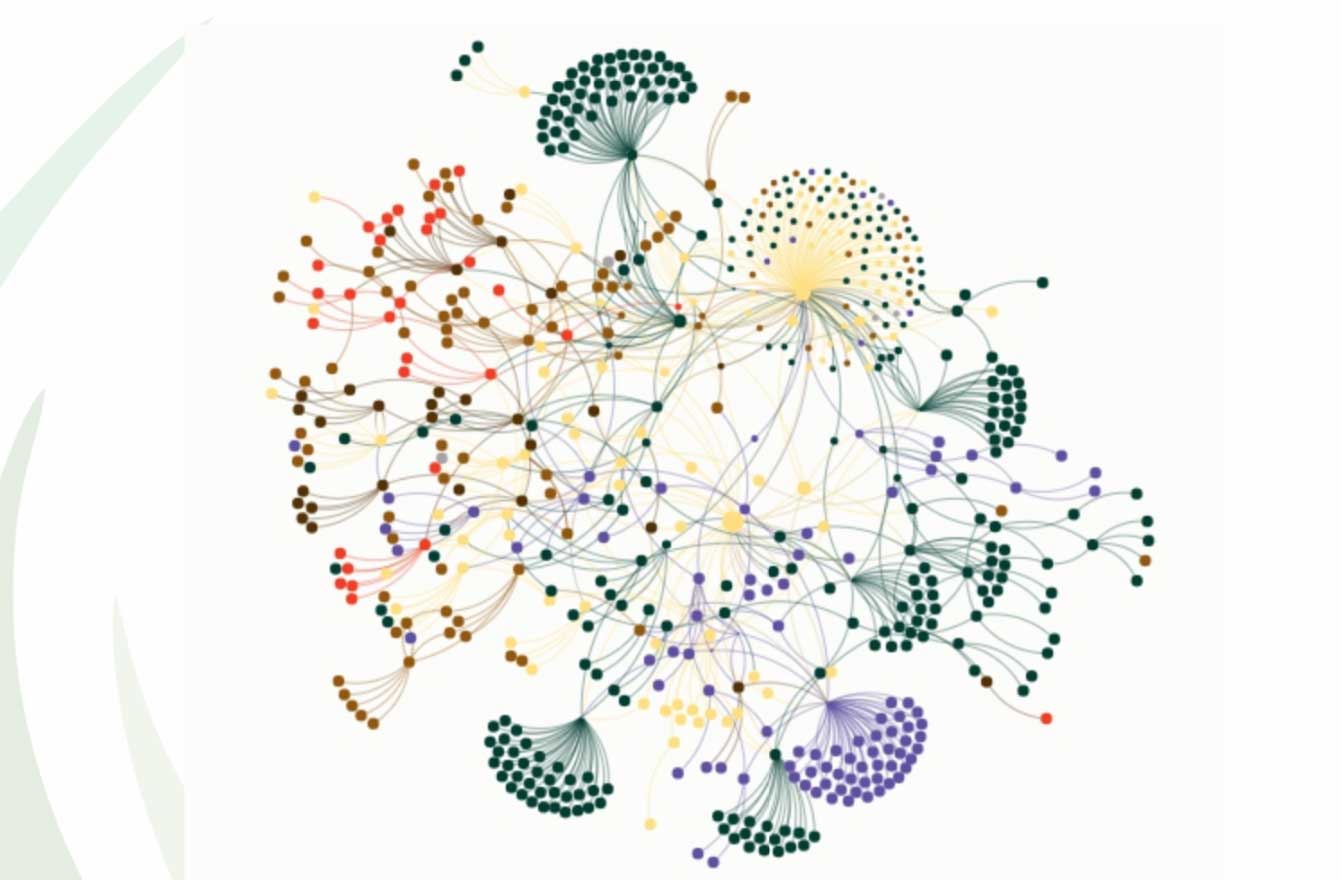
Our Partners’ View Point

At PIND, we pay attention to what our partners say about us to learn what we are doing well or what we need to improve on. We share a few of these with you here..
“I commend and congratulate the Chevron-funded Foundation for Partnership Initiatives in the Niger Delta (PIND) for the sponsorship of this laudable project of the Cross River State Growth & Development Strategy (GDS)” - Professor Ben Ayade, Executive Governor of Cross River State, November 2018 on the GDS acknowledgement page”
“PIND Foundation is indeed doing an exceptional work in the Niger Delta. Through its various intervention programs, farmers and SMES across the Niger Delta states have been able to increase production and income’’ – via Twitter, Kelechukwu Iruoma, a freelance journalist covering education, agriculture, climate change, politics, environment, aquaculture and other development issues in Nigeria”
“I see PIND as a strategic partner, I see them as a mentor, I see them as a platform, and I see them as a place where we can draw strength from, and where we can lean on. PIND offers that platform to connect with other people, to see what they are doing, to share, to connect with their wealth of experience, to understand their market niche, their target market, to see what they are doing differently” - Alfred Ukane, an agricultural economist at Chuvaak Nigeria Limited
“Why I so much like the capacity building approach of PIND under CAPABLE is that they have a sort of strong relationship with partners with who they are building the capacity. And in capacity building, that is important. Two, their own capacity building is not just assemble people in the hall and train them whether they need the training or not. Their capacity building is need based and because it is need based, they established relationship with most of their partners and have baseline information on them in terms of what their capacity building issues are and what are the capacity areas. And then they begin to focus on the capacity gaps of the CSOs through a very systematic approach” - Ahmed N Mohammed, Independent Consultant
“PIND represents partnership and respect for each other. Relationships are about social contract. Decline in the development sector in the Niger Delta has been because that social contract has been breached by those who are supposed to, not just the Federal Government or the state government, but even community leaders.” – Inemie Datie-Ikoko, Centre for Information and Development, CFID
“We see PIND as a development NGO that is positioned to provide development programmes for the benefit of the people of the Niger Delta Region. And so, we’ve been working with them as a Chamber of Commerce and in fact, the key Chamber of Commerce in the South-East and South-South of Nigeria”- Erasmus Chukwumba, Director General, Port Harcourt Chamber of Commerce, Industries, Mines and Agriculture.
PIND can do better by bringing us in...whatever PIND is doing is impacting but what I am saying is that it’s still minimal to what we can do (together), they can do much more in getting government involved much more like in terms of equity holding then we can draw greater advantage. So PIND has to open up, allow a greater role in what they are doing and not just having us on advisory basis -Akwumukwa Chibo, Permanent Secretary Abia State Small and Medium Enterprise Development, Member, NDYEP Advisory Board
Download Analysis & Advocacy Report
Capacity Building Program
Organizational and Service Delivery Capacity Development of CSOs & BMOs
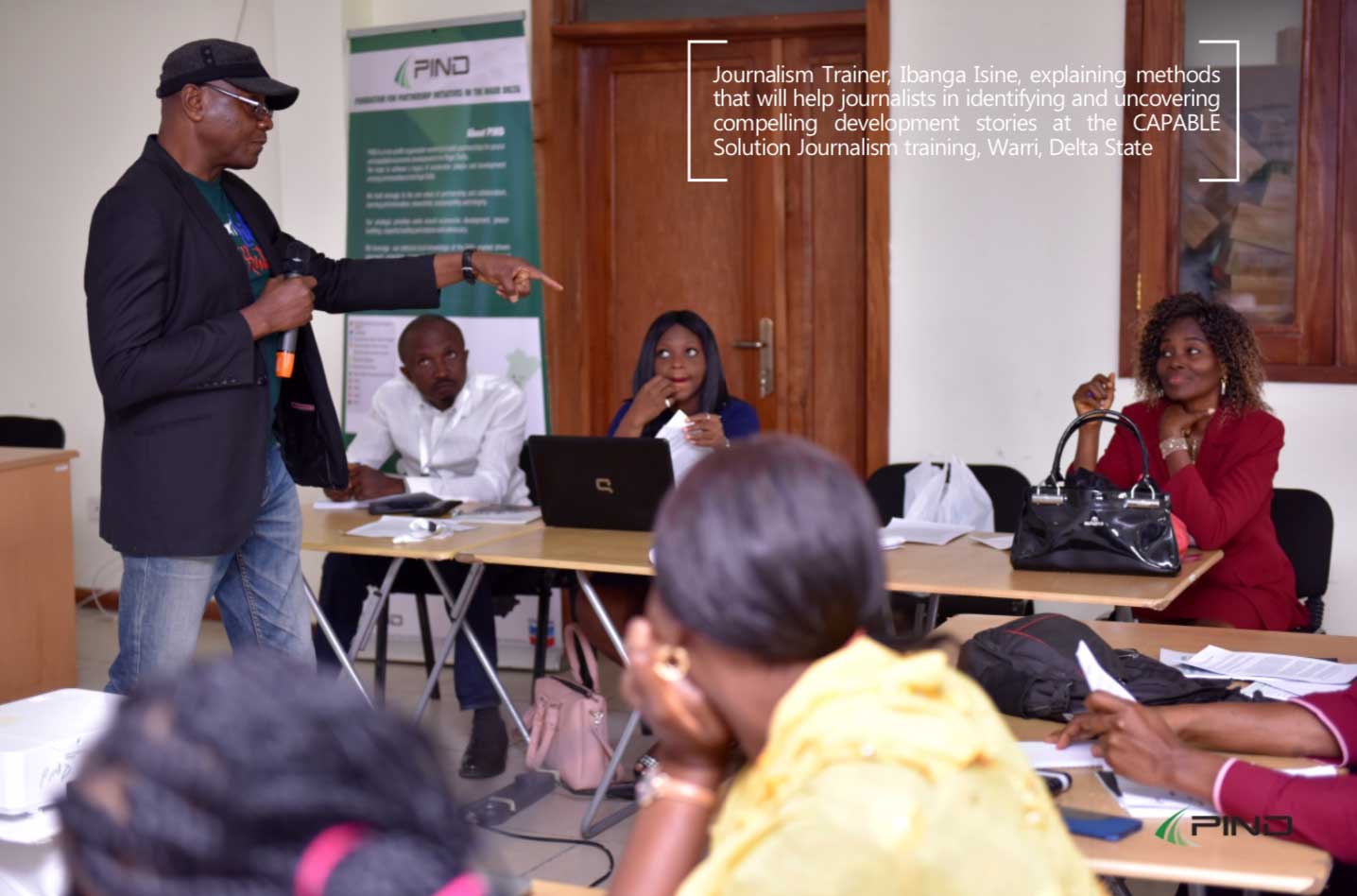
Our ‘learning by doing’ coaching and mentoring support on proposal writing and resource mobilization skills helped 54 Civil Society Organizations to overcome their inability to mobilize funds for social and economic services as they accessed grants worth over NGN434 million to implement community development services during the year
FACT BOX
2010-2018: Grooming Local CSOs

Of the many constraints facing many Niger Delta-based CSOs and BMOs, their inability to generate and mobilize resources to run their programs has ensnared them into some unhealthy dependencies for funds and limited the scope of their service delivery. Therefore, our CAPABLE program and our partnership project with USAID, the Strengthening Advocacy and Civic Engagement (SACE) project has over time specifically focused a variety of human capacity development activities towards increasing their skills to attract funding. Participating organizations learned how to diversify resources, increase their knowledge of the donor landscape and available resources that could be leveraged, and develop skills in project design and proposal writing.
An official of one of the CSOs operating in Akwa Ibom State, Elizabeth Adebanjo of Antof Rural Development Centre admits, “I couldn’t write a proposal … a consultant was engaged to write the proposal that eventually got us a grant”. The breakthrough for the organization came after deploying PIND’s grant and proposal writing skills to win a World Bank grant for HIV prevention in Akwa Ibom State.
“Because of the skills that we have acquired, when they made that call every other person in Akwa Ibom responded, and that was the call by World Bank for HIV prevention in Akwa Ibom. By the grace of God, we got that grant. Through that project, we reached over 12,000 people, youths, farmers and pregnant women. That was the largest number of beneficiaries we reached on a single project at once since we started the project. We can't thank PIND enough because our story as an organization is not complete without PIND. It is not hype because at the stage we are now, we are very competent and it is because of CAPABLE advantage in Akwa Ibom State."
This year, data from our capacity development effectiveness survey which polled 39 CSOs and two BMOs showed that funding which had been a significant constraint to the adequate performance of these CSOs has improved. A large number of them now understand how to source for funds using the skills they acquired during the training—they have put their grants and proposal writing skill into practice, and it has yielded results. In 2018 alone, 54 organizations accessed grants worth over NGN434 million ($1,240,000) from donors to implement active community development projects. This means more funds for social services and for quality participation in governance.
Finally, as our SACE project closed out this year, it recorded an important outcome as three (3) Niger Delta-based CSOs (LITE Africa, African Network for Environment and Economic Justice (ANEEJ) and Youth Alive Foundation) it provided organizational strengthening to became certified to receive US Government funding. This bodes well for the region as there is a high probability of these CSOs receiving funding to continue their service delivery to the communities after the close out of the SACE project.
CAPABLE Human Capacity Development Approach
Capabilities: trained select representatives of CSOs and BMOs on key organizational development and operational skills and subsequently provided direct technical advisory through in-house coaches and mentors to aid learning by doing.
Resources: Provided post-training technical assistance grants and coaching/mentoring to help organizations to address capacity constraints or apply skills gained.
Platforms: Linked trained CSOs and BMOs into a Community of Practice (COP) to institutionalize continued peer learning, information sharing and collaboration and facilitated their participation in various platforms for regional discourse and collective action to address enabling environment governance related constraints.
Between 2012 and 2018, CAPABLE has enhanced the capacities of more than 160 CSOs and BMOs in the Niger Delta and there are empirical pieces of evidence to show improved outputs and impacts made by organisations, especially around fundraising.
WATCH OUR SACE PROJECT CLOSE-OUT VIDEO
Modupeola Adetula’s Melville Women Initiative in Akure and Owo, Ondo State, focuses on women health and empowerment. With the knowledge and skills acquired from CAPABLE resources and training on proposal writing, her organization has attracted multiple funding.
Before the training, I was giving out proposals for people to write for me. Writing a proposal was a serious challenge for us. We were contracting it out to people, and unfortunately, the people I contracted it to would always write good ones for themselves, and I would not get proposals as good as theirs. Look at the World Bank social grant for the poor, I got it through my mail, over 70 CSOs within my state applied for it. I got it – just three of us got it. I wrote the proposal myself and got N8 million grant. I wrote another one for the Melville Group; the community women we just finished attending a workshop with and they were given the grant to work. All these were possible because I have been trained and was able to train them equally on skill acquisition. I have got N15 million-project, N6 million-project and N5 million-project all through the training I got from CAPABLE. My organization is doing well. We are working effectively, many thanks to CAPABLE.
Building Capabilities for Solution Journalism to Support Development Goals: Focus on the Media
The media constitute part of civil society, albeit playing a unique role. This year, our CAPABLE program packaged and delivered a specialized training course on Solution Journalism to 27 (15 female and 12 male) select journalists from print, electronic and online news media. Solution Journalism is an approach to news reporting that focuses on reporting solutions to known problems to promote their possible replication and scale up by other actors. During the training, journalists were exposed to modules on tested and proven development models suitable to the Niger Delta context. This improved their understanding of the challenges affection farmers and SMEs in the region and the role the media can play in finding solutions. The training successfully ignited passion and re-directed the thinking of journalists towards developmental stories.
My focus will change from reporting violence in the Niger Delta to searching for solutions to solve everyday issues of local people
—Shola O. Niel, The Nation Newspaper.
One of the major challenges mentioned by journalists at a brainstorming session during the CAPABLE Solution Journalism training was lack of resources by their media houses to support development journalism. To address this challenge and stimulate the application of the learned solution journalism skills in line with our human capital development approach, in November of 2018, PIND launched a competitive N3.4 million journalism grant to promote development reporting in the Niger Delta.
A CAPABLE Roundtable with Niger Delta CSOs/BMOs and donors in Abuja The grant aimed to reinforce the competencies of the trained communicators in solution, investigative, and data journalism. With the PIND media grant, journalists reporting on the Niger Delta can now go beyond routine coverage of the region to identify, pursue, investigate, analyze, explore, empower and engage with different stakeholders including policymakers to inform and transform the lives of poor people living in the Niger Delta, especially women. Selection of media grantees commenced in 2018 while the development report outputs are expected to roll out in 2019.
WATCH THIS VIDEO ON CAPABLE ANNUAL LEARNING FORUM WITH CSOs
Solid Focus on Gender Mainstreaming

Tackling Women’s Economic and Social Issues
Gender mainstreaming means ensuring everyone, male and female alike, is befitting from the work we do. In implementing our project activities during the reporting year, we carefully sought to spread the benefits of our work to women, who are most marginalized in the region. By the end of the year, out of the 34, 096 total beneficiaries of PIND’s activities, 12,663 of them were women, attaining 37% out of a target of 40%.
FACT BOX
2018: Mainstreaming Gender
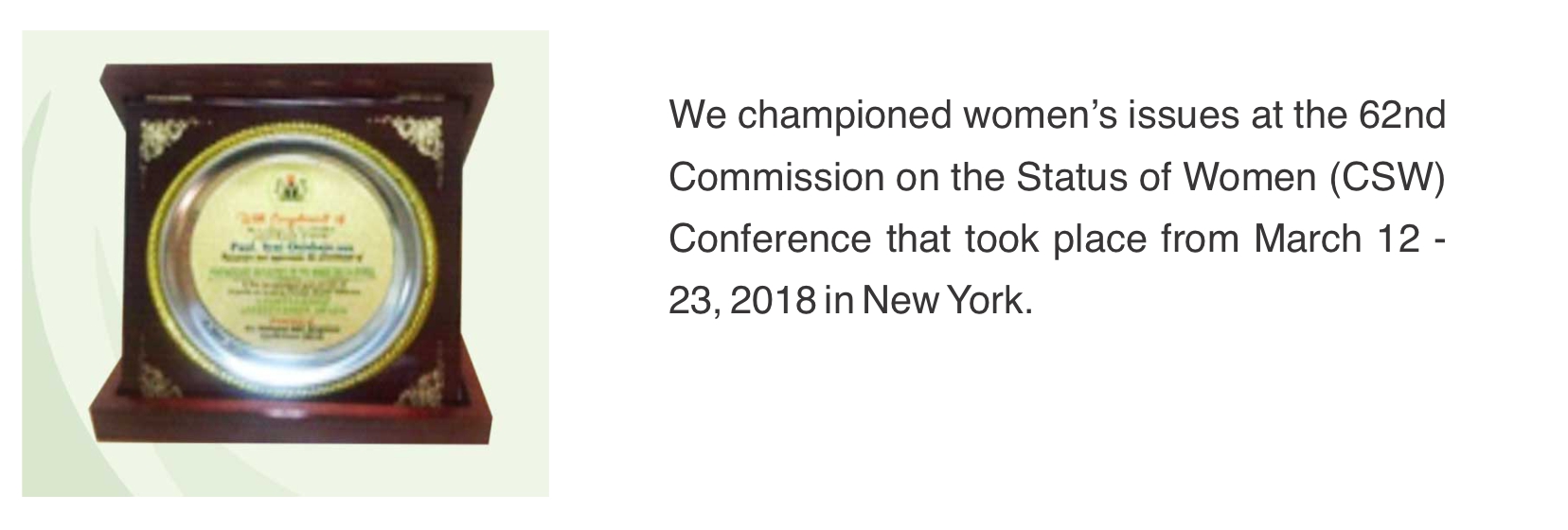

We empowered CSOs to advocate against gender-based violence (GBV) during the 2018 16 days of the campaign against GBV from November 25 to December 10
We increased stakeholders’ awareness of Violence against Women and Girls (VAWG) by collecting and sharing early warning data from around the Niger Delta on the issue.
We continued to build the capacity of our internal teams on gender mainstreaming because we know they cannot do this effectively if they do not grow with the changing dynamics of gender
For PIND, gender mainstreaming is not only about including women as intervention beneficiaries. It is also about deliberately addressing issues limiting women's economic and social wellbeing. So we did more than achieving 37% gender inclusion in 2018.
Tackling Women’s Economic and Social Issues
We built capacity and facilitated opportunities for women farmers to lead advocacies on their issues by themselves using the International Women’s day (IWD). To observe the 2018 IWD, the Foundation partnered with Cara Development Foundation and the African Youth Development Foundation to organize a one day outreach in Umukabia Ogodo, Ngor Okpala in Imo State. During the outreach, smallholder women farmers were allowed to showcase their contributions to the rural economy and to draw attention to the constraints limiting them from maximizing opportunities in their respective agricultural value chains to an audience of 310 persons inclusive of stakeholders from government, development sector and the traditional institutions. With functional advocacy skills, women can amplify their voices in promoting gender equity. In continuation of the IWD outreach, we provided advocacy training to 25 members of the Aladinma Women Multi-Purpose Cooperative Society, Umukabia Ogodo in Ngor Okpala LGA, with about 250 members in Imo State. Using the skills gained from the training, the women farmers conducted an advocacy visit to the traditional ruler, the Okabia 1 of Umukabia and presented their advocacy brief on the effect of conventional land practices on them. The results include the allocation of small portions of land for women in commercial farming which limits their productivity as well as the land tenure system practice that mandates leaving farmlands fallow for four years after a farming cycle. The traditional leader is currently deliberating on the issues with his council, with a commitment to address the problem.
We championed women’s issues at the 62nd Commission on the Status of Women (CSW) Conference that took place from March 12 - 23, 2018 in New York. The CSW is the single largest forum for the UN Member States, civil society organizations and other international actors – to build consensus on measures to bring substantive gender equality and commitment on policy actions. More than 4,300 representatives from over 600 civil society organizations and 170 member-states attended the 2018 CSW. There, we learned about new trends and initiatives that we can adapt to strengthen our work in promoting equal access to economic and productive resources for women.
We empowered CSOs to advocate against gender- based violence (GBV) during the 2018 16 days of the campaign against GBV from November 25 to December 10.
To commemorate the day, PIND awarded grants to four organizations in the Niger Delta - Green Concern for Development (GREENCODE), Community Resources Development Organization, and Center for Development Support Initiative and Development Initiative for Community Impact (DICI) to hold various advocacy activities to campaign against Gender Based Violence (GBV) in their States. During the campaign, some of the activities carried out with PIND’s support included a street rally and advocacy to Cross River State House of Assembly by Greencode campaigning against ‘Money Marriage' - using daughters to settle debts. Others were sensitization visit to Ugbuwangue Secondary School Students on GBV; and the handing over of a GBV Complaint Box to the Provost of the Delta State College of Education during an advocacy visit to the College by DICI.
Money-woman marriage is a cultural practice in Becheve and Utanga communities in Cross River State where a girl's parents exchange their girl child as collateral to get loan, property, food or to settle a debt that was owed even before her birth. GREENCODE, as part of its advocacy activities, held a one-day community dialogue on the practice in Becheve and Utanga ward of Obanliku Local Government Area of Cross River State.
Felicity Sango, 22, was a victim of money-marriage and she narrated her experience at the community event held on December 10, 2018. According to Felicity, “I feel really appreciative to be part of this two days activities for all the knowledge gotten, and I promise to be an advocate to other girls not to fall victim of money-woman marriage". At the end of the community dialogue, a resolution was reached by the community members to drive the stop of money-marriage in Becheve.
We increased stakeholders’ awareness of Violence against Women and Girls (VAWG) by collecting and sharing early warning data from around the Niger Delta on the issue.
The Foundation launched an early warning advocacy product series that covers both policy/thematic issues, and tracks levels of VAWG reporting in the Niger Delta. The briefs stimulated interest among key peace actors including the media. The October 2019 special brief focused on the prevalent issue (and under-reporting) of human trafficking, forced labor and slavery in the Niger Delta. Titled ‘Deception and Exploitation: Human Trafficking in the Niger Delta’, the brief examined the types, drivers and impacts of human trafficking, as well as the gaps in response and community awareness of the issue. As a result of our strategic focus on this gender issue through our early warning and response, there has been a noticeable increase in mainstreaming of VAWG incidents by organizations contributing to PIND’s Peace Map, such as Nigeria Watch and Community Initiative for Enhanced Peace and Development (CIEPD).
We continued to build the capacity of our internal teams on gender mainstreaming because we know they cannot do this effectively if they do not grow with the changing dynamics of gender.
Resulting from this, our teams carried out 11 gender mainstreaming actions in implementing the Foundation's gender policy in 2018, and our gender team contributed to deliberations on advancing positive gender actions in Nigeria through participation in the Development Partners Group on Gender (DPGG).

Organizational Capability
Excellent Governance, Skilled and Committed Workforce
The Foundation is proud of the strategic guidance and governance of our Board of Trustees in 2018. Their insights, experiences and services assisted us in creating significant impact towards peace and equitable development in the Niger Delta

Excellent Governance, Skilled and Committed Workforce
The PIND Team
Building successful partnerships is important. But more important than that is finding the right people who will make them work to deliver the economic and social impact sought. PIND understands this and has over the years, carefully sourced, engaged and built the capacity of our expert pool of program and non-program teams who understand the Niger Delta development context, what needs to be done and how it should be done. Together, working across states, sectors and multiple stakeholders, they made all the results in this annual report a reality.

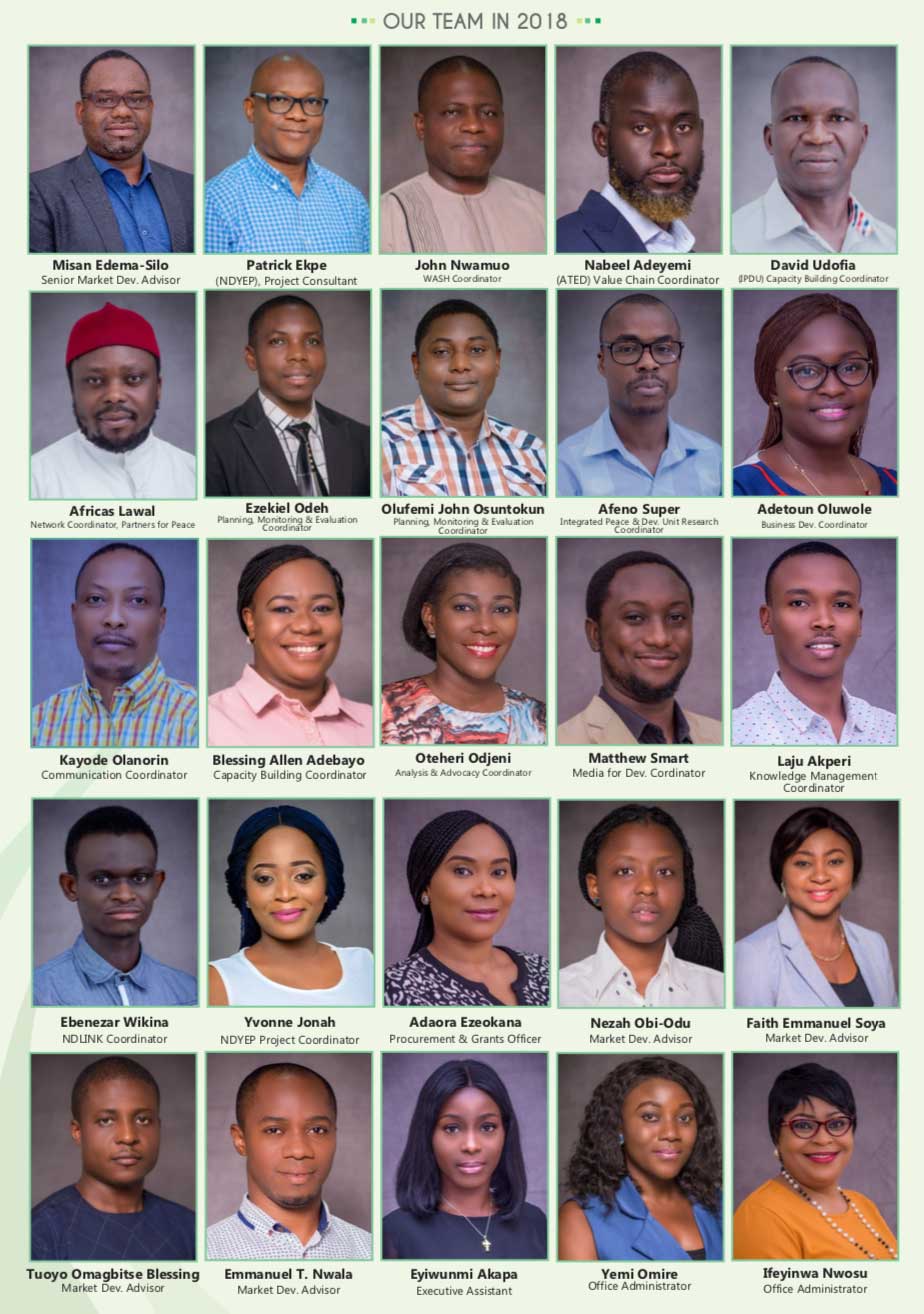
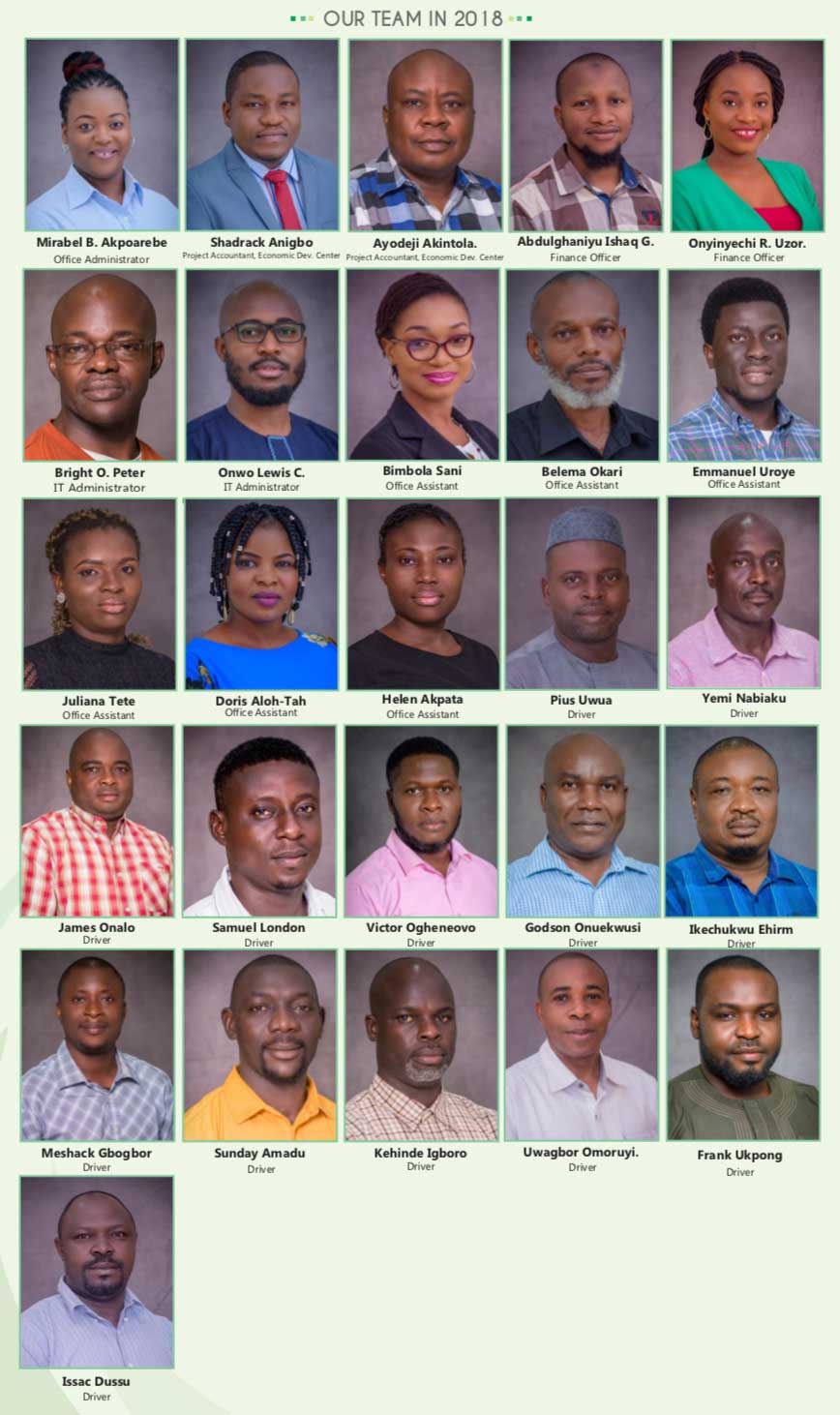
Team Engagements
Obsolete knowledge cannot produce transformative results. So we invest in continuous learning and competency development for our team through a dedicated organizational development project (ODP). In 2018 alone, the group enjoyed 30 capability building opportunities.
The training on early warning & response building capacity for preventive peacebuilding at the West Africa Peacebuilding Institute (WAPI) and Kofi Annan International Peacekeeping Training Centre has deepened my knowledge of the working of continental early warning systems and afforded me the opportunity to develop contact with a good number of ECOWAS early warning practitioners” - Afeno Super, PIND IPDU Research Coordinator
Health and safety of our people are vital to us! And good health, safety and environmental practices are integrated into our field operations along with weekly security tips to guide work. In 2018, our field teams successfully travelled over 250,000 miles in over 450 trips around the region, including hard to reach coastal areas, to deliver development solutions.
Recognizing good work gives wing to innovation and superior performance! The fun and glitter of our 2018 annual team building and rewards & recognition event gave team members time to bond with one another, relax, enjoy, and be proud of their achievements for the year – and to gear up for the year ahead with a determination to change more lives.
The combined up to date expertise of our team in sustainable poverty reduction and conflict mitigation programming, effective organizational systems and administration, and team recognition ensures our efficient operations, systems, partnerships networks and interventions are continuously transformed to deliver higher value.
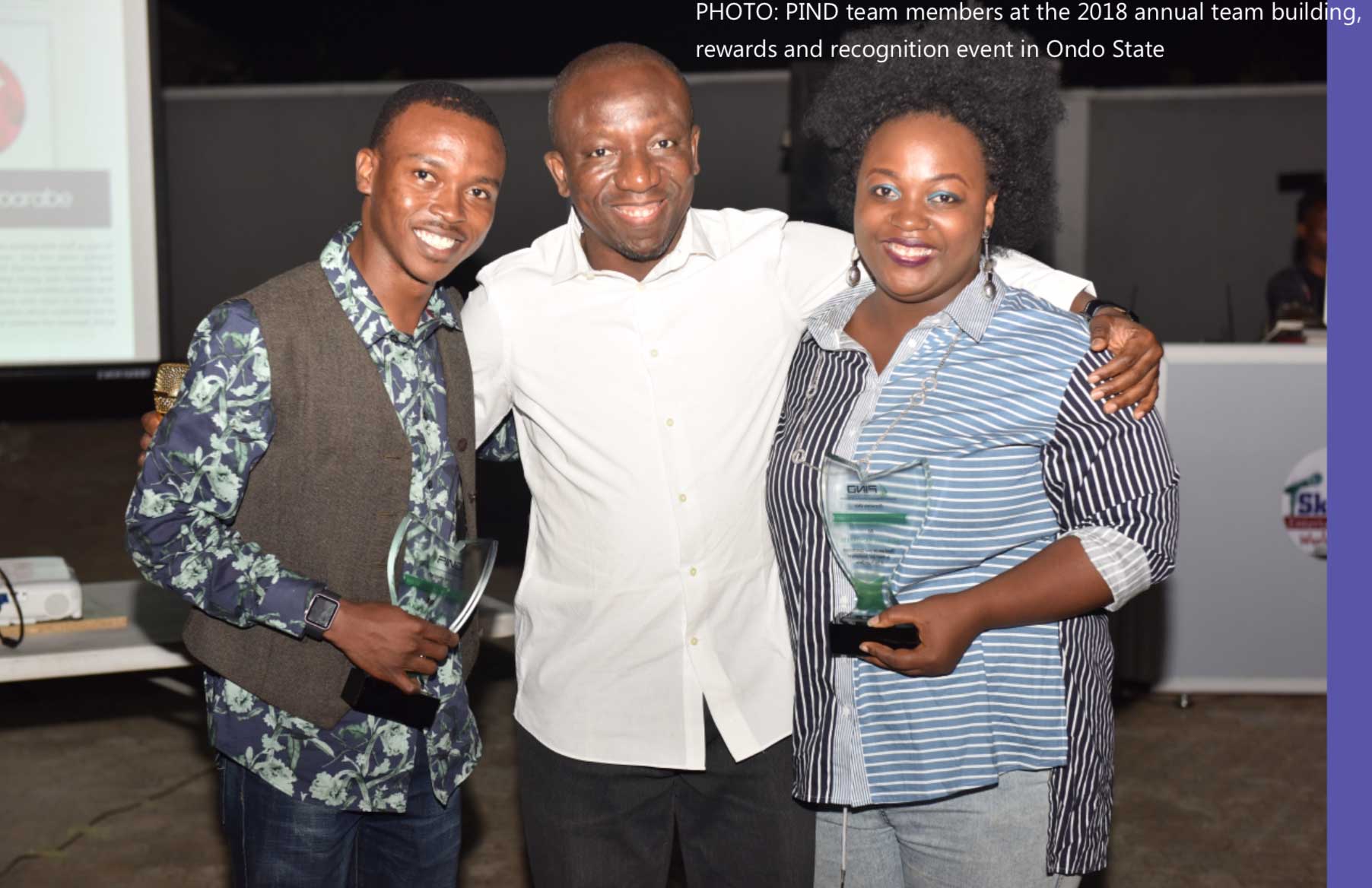
Financials
Report on the Audit of the Financial Statements
Contact Us
www.pindfoundation.org
Twitter: @pindfoundation
Instagram: @pindfoundation
Facebook: www.facebook.com/pindfoundation
Linkedin: @pindfoundation
YouTube: @pindfoundation
Contributors
Content creation: Chichi Nnoham-Onyejekwe, Laju Akperi and Kayode Olanorin
Photos: Media for Development Unit, PIND Foundation
Web Design: MEL-Technologies.
Head Office:
25 Jimmy Carter Crescent Asokoro, Abuja
+234 (09) 291 0454
Warri, Delta State:
Economic Development Centre
1 PIND- EDC Drive Egbokodo – Itsekiri
+234(0)8172401598, 09030808794
Port Harcourt, Rivers State:
Economic Development Centre
6 Tombia Street GRA Phase 2
+234(0)8110521802, 0903457798
Contact
www.pindfoundation.org
Twitter: @pindfoundation | Instagram: @pindfoundation
Facebook: www.facebook.com/pindfoundation
Linked in: @pindfoundation | YouTube: @pindfoundation
Head Office:25 Jimmy Carter Crescent Asokoro
+234 (09) 291 0454
Warri, Delta State:Economic Development Centre
1 PIND- EDC Drive Egbokodo – Itsekiri
+234(0)8172401598, 09030808794
Port Harcourt, Rivers State:Economic Development Centre
6 Tombia Street GRA Phase 2
+234(0)8110521802, 0903457798
Contributors
Content creation: Chichi Nnoham-Onyejekwe, Laju Akperi and Kayode Olanorin
Photos: Media for Development Unit, PIND Foundation







